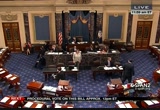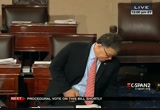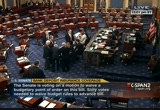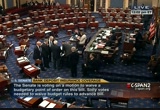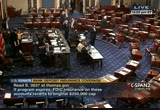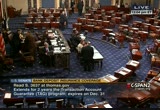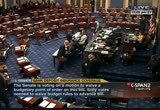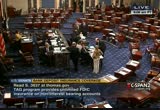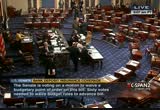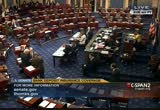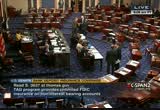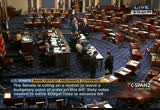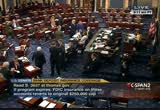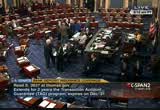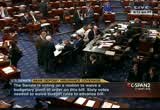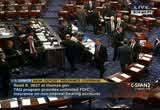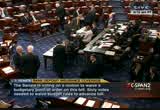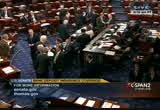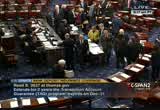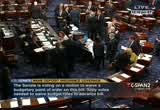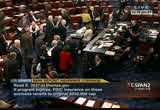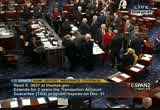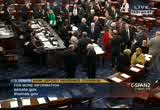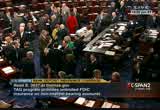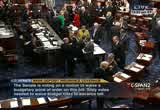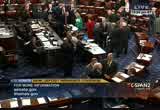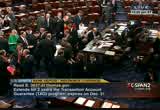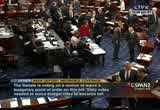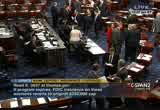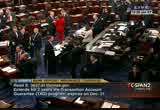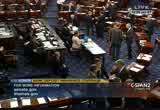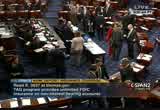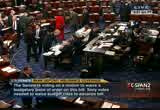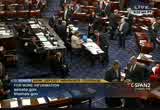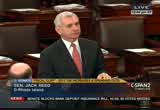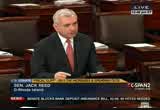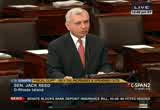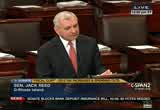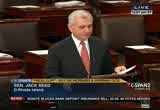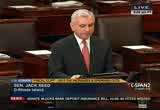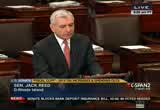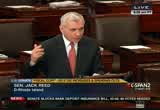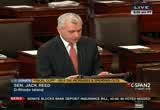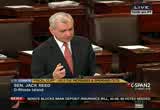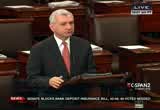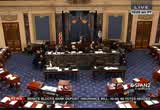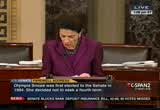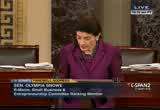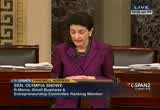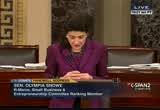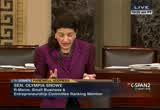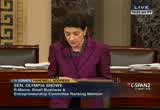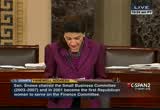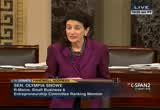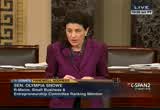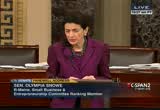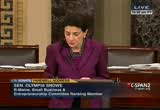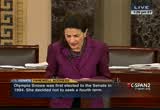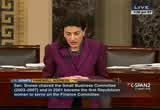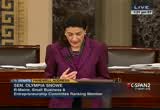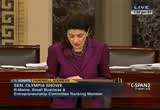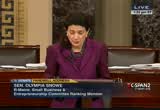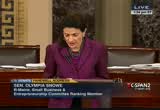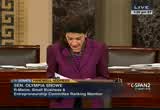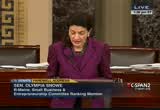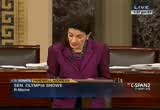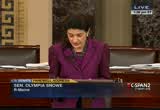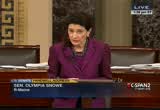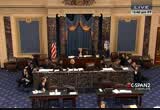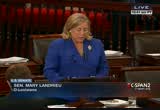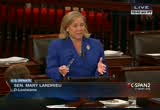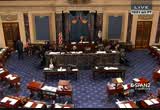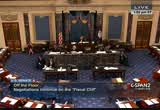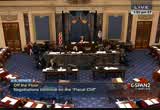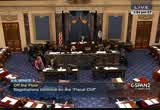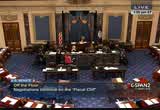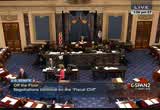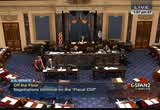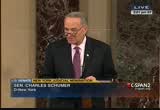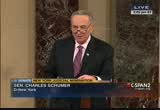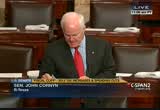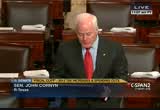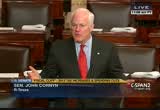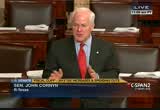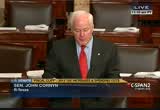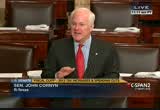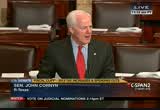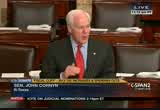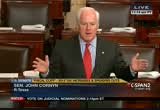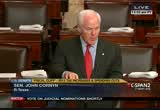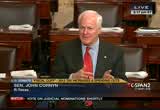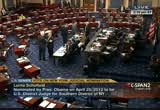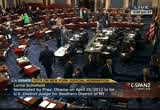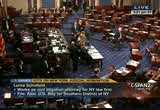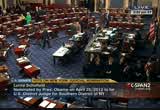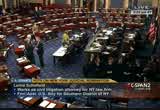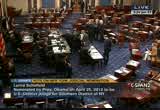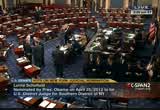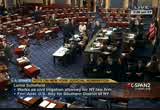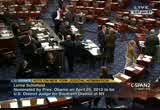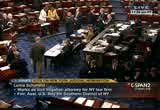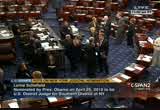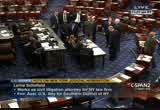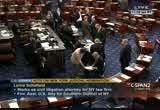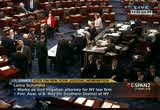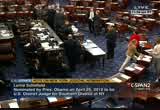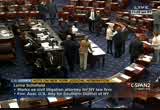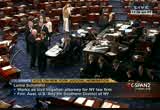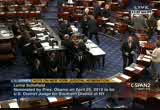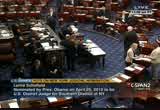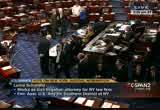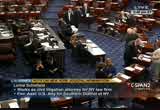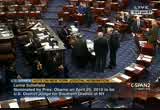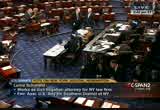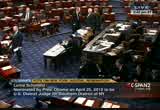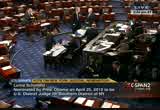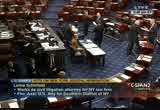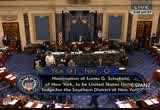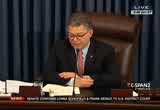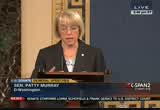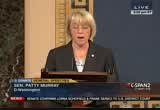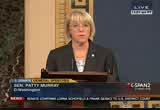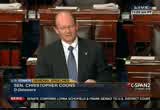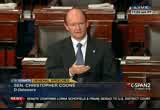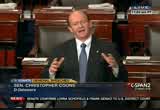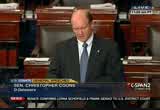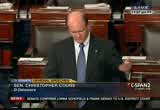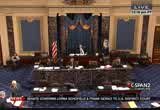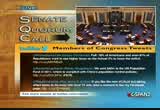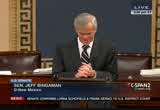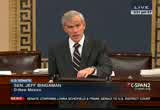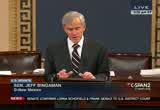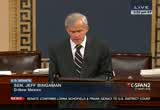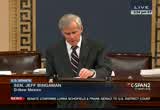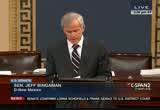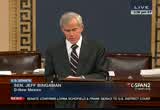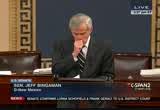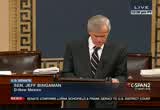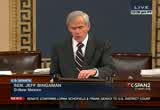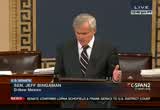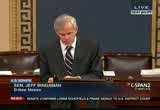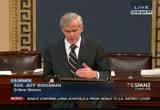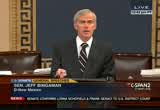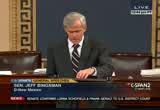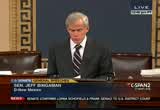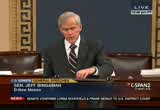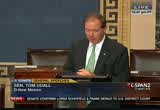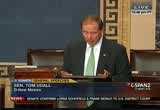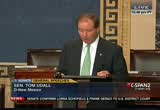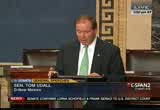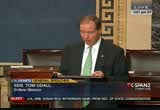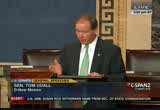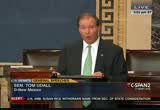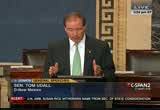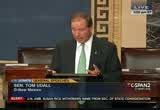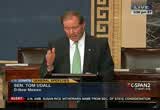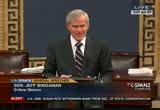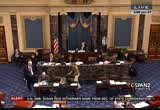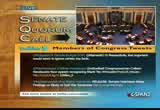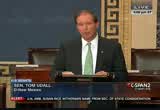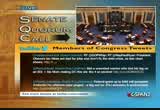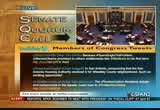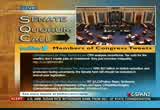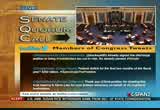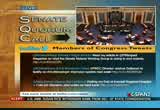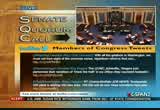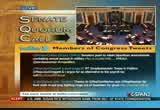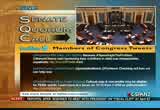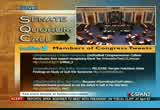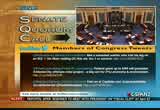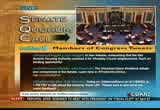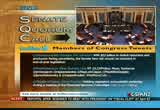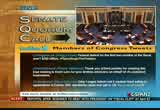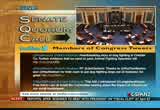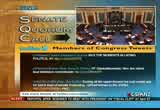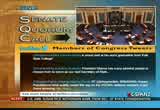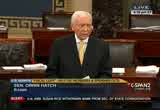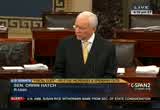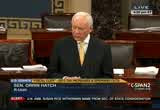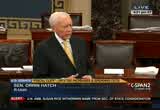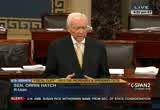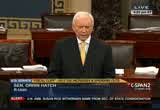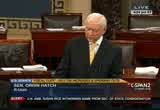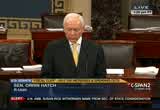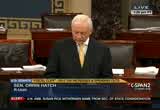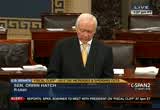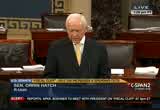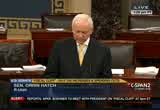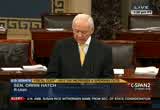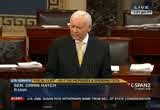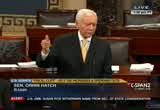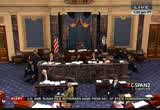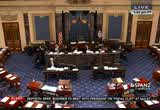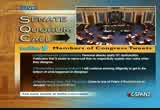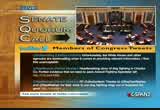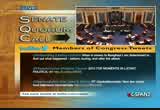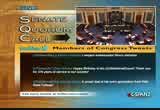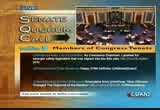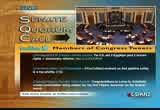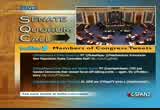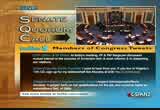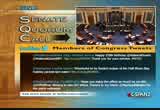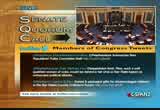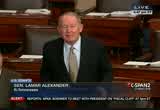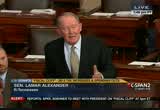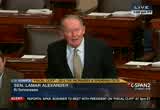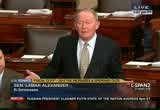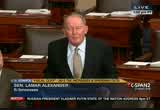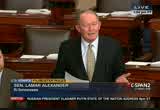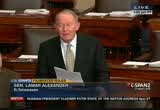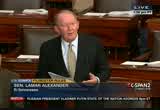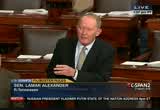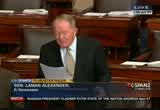tv U.S. Senate CSPAN December 13, 2012 12:00pm-5:00pm EST
12:00 pm
12:01 pm
12:33 pm
the presiding officer: are there any senators wishing to vote or to change their vote? seeing none, on this vote the yeas are 50, the nays are 42. three-fifths of the senators duly chosen and sworn not having voted in the affirmative, the motion is not agreed to. the point of order is sustained. under the previous order, the motion to invoke cloture on s. 3637 is withdrawn. the majority leader. mr. reid: i ask unanimous consent we proceed to a period of morning business until 1:45 today. the presiding officer: may we have order in the chamber, please. mr. reid: i'll are start over again, madam president. i ask unanimous consent that on thursday, that's today, december 13, at a quarter till 2:00 the senate proceed to executive session to consider
12:34 pm
the following nominations, calendar numbers number 830, 832, there be 0 minutes for dwaid debate equally divided in the usual form, upon the use or yielding back of that time the senate hat proceed to vote with no intervening action or debate on calendar number number 830 and 832 in that order. that the motion to proceed be considered made and laid on the table with no intervening action or debate and there would be no further motions in order. and any statements related to this matter be printed in the are appropriate place as if given and the president be immediately notified of the senate's action and the senate then resume legislative session. the presiding officer: is there objection? without objection, so ordered. mr. reid: i ask unanimous consent the senate proceed to a period of morning business until 1:45 p.m. today with senators permitted to speak up to ten minutes each. further that senator snowe be recognized at 1:00 p.m. for -- why don't we -- yeah, 1:00 p.m. for up to 45 minutes. finally at 1:45 p.m. the senate
12:35 pm
proceed to executive session as provided under the previous order. madam president, if you would rule on that. the presiding officer: without objection. mr. reid: madam president, we hope that after the first vote this afternoon that we'll be in a position to enter an order that we would move to -- we would be on when we come back here on monday the supplemental. we'll come in earlier than usual, there will be a vote at a 5:30 on a judge but during the afternoon there will be a case made for the supplemental. we hope to have a consent agreement on that in the next couple hours. the presiding officer: the republican leader. mr. mcconnell: madam president, could we have order in the senate. the presiding officer: please take your offer sayings out of the senate chambers. the republican leader. mr. mcconnell: madam president, i'd like to continue the difficult task of saying goodbye to senators who
12:36 pm
won't be with us in the next congress. and sadly, that includes senator scott brown of massachusetts. senator brown came to us already something of a political legend, and in just a few short years he leaves behind an outsized legacy. we all remember how scott rose to national prominence in the election literally heard round the world. after the death of senator kennedy, there was an open seat in massachusetts, and a special election to fill it. and few people even entertained the thought of a republican winning. and for good reason. few states are as synonymous with political liberalism, democrats outnumber republicans in the state 3-1, and the entire congressional delegation is composed of democrats. but supported by his wife gale and their daughters along with
12:37 pm
some key early allies including our own senator mccain, scott appealed to the state's independents, ran a flawless campaign, and won. as he put it on election night, he beat the odds and the experts. and the people became the machine. i think that 2006 g.m.c. canyon that scott drove around in the election actually should go to the smithsonian. we all remember that night and in particular scott's acceptance speech. most people focus on what he said about his daughters, but the speech itself was a masterpiece. it perfectly summed up the political moment, and it captured something essential about scott's success. and that's the notion that no politician has a right to his or her seat, that we're all here to serve our constituents. every day i hold this office, scott said, i will give all
12:38 pm
that is in me to serve you well and to make you proud. and most of all, i will remember that while the honor is mine, this senate seat belongs to no one person and to no political party, and as i've said before, and you said loud and clear today, it is the people's seat. scott lived up to his promise. he captured the imagination of the entire country when he corrected david gergin by telling him the so-called kennedy seat was, in fact, the people's seat and he carried that message straight to washington. i remember scott telling me in our very first meeting that i couldn't count on his vote. that i'd have to earn it. i told him could do whatever he pleased and while he hasn't been here long, he certainly made his mark. i've seen a lot of politicians in my day, but few if any have been as talented as scott brown.
12:39 pm
he is a unique talent. and i have no doubt we'll see him back in washington someday in the not-too-distant future. the truth is scott's victory wasn't the first time he'd done what others thought impossible. as a young man, he knew poverty first hand, and a broken home. and even took to shoplifting to feed himself and his sister. yet scott overcame these early challenges and as is often the case, he owes a lot of it to an adult who saw his potential early on. in scott's case, that adult was judge samuel zall. when scott showed up in his chambers one day, the judge saw a troubled but decent young man who needed a friendly nudge. we had a long talk about the talent i thought he had, and i
12:40 pm
didn't want to see him squander it, judge zall later recalled. scott, of course, remembers it a little differently saying the judge -- quote -- "verbally kicked his butt" -- end quote. the judge ordered scott to write a 1,500 word essay about disappointing his family. madam president, could we have order in the senate. the presiding officer: please take your conversations out of the senate chambers. the republican leader. mr. mcconnell: the judge ordered scott to write a 1,500 word essay about disappointing his family. after reading it, he told scott he would give him a break this time but if he ever stole anything again, anything, he'd be sent to jail. judge zall's lesson remained so deeply that they were friends until the judge's death last year. scott went on to be a basketball
12:41 pm
star in college, earning the nickname of downtown scotty brown. then to law school, the army national guard, city and state political office where he was one of just five republicans in a body of 40 in the state senate, and then the u.s. senate. senator brown also famously found time to do a little modeling in his youth and it was through this work that he met his wife gail. i've had the pleasure to get to know scott and gail really well over the last three years. they have two daughters and make an absolutely wonderful family. i'm sure gail, hyla and arianna are very, very proud of scott and just as proud as i am to see his tenure here cut short but they should be proud of the fact that scott has accomplished a lot in three short years here in the senate. he led the charge to repeal a burdensome withholding tax that
12:42 pm
hurt small businesses, he crafted legislation for crowdfunding which allows job creators to raise start-up funds for their businesses over the internet with less red tape and he introduced legislation to ensure that children's hospitals have access to discounts on orphan drugs that are used to treat rare diseases. all of these bills are now law. as a 32-year member of the national guard, senator brown takes a special interest in our men and women in uniform and their families. he introduced legislation to give businesses and incentives to hire veteran who sadly, have higher unemployment rates than the national average. he introduced and sought a path to legislation creating an office of service affairs, to
12:43 pm
protect troops who are often targeted by financial scams. he sought page to make it easier to avoid government contracts with businesses funneling resources to terrorist groups and he fought for the national guard members and their families to receive their fair housing allowance when deployed overseas. through his work here in the senate, though his work here in in the senate has come to an end, i'm sure scott brown's work in public service in whatever capacity will not. he's still a young man with a bright future ahead of him and i for one am very much looking forward to see how he uses his threntsz next. from the statehouse to the u.s. senate to the modeling chute to the basketball court, senator scott brown has always made his own success. i don't think he knows any other way. scott, it's been an honor serving with you. you not only made history, you
12:44 pm
made a difference, and you should be proud. madam president, i yield the floor. the presiding officer: the senator from rhode island. mr. reed: madam president, i would ask unanimous consent to speak up to 15 minutes rather than 10 minutes as customary for morning business. the presiding officer: without objection. mr. reed: madam president, i rise today to speak about the real-world consequences of failing to achieve a fair and balanced solution to avert automatic tax hikes and spending cuts that would otherwise occur at the end of december, the end of this month. failing to continue unemployment insurance, allowing taxes to rise on middle-income americans and cutting federal spending too much and too soon during a struggling economic recovery could, as the nonpartisan congressional budget office has estimated, cause a recession, a new recession. this is a fate we can and should avoid for people in my state and across the country. indeed, families in rhode
12:45 pm
island are still getting their economic footing and cannot afford another economic setback, and -- an economic downturn will erase the straidz we've made to strengthen our economy and exacerbate the widening income inequality which americans sense and recognize in an economy that all too often seems to be stacked against them. instead, we must work toward a compromise that's fair, helps the middle class, creates jobs, and strengthens and accelerates our economic recovery. as i see it, widening income inequality in sense that future generations won't see the same kind of economic security as my generation is one of the most pressing challenges facing our nation. over the past several decades, top earners have taken a bigger and bigger chunk of income while wages have stagnated for far too many americans. from 2000-2007, incomes for the
12:46 pm
90% of workers rose by about 4%, while the top .01 of 1% of americans saw income games of 94%. the vast majority of americans have seen barely enough to keep their heads above water, while the very, very, very small top income earners have seen an extraordinary growth in income. and in 2010 alone, about 20% of all income went to the top 1%. 20% of income to the top 1%. we are now back to income inequality levels similar to just before the great depression. and such wide disparities are unsustainable, create economic instability and, indeed, threaten our social fabric. in the past when income inequality has reached these kinds of levels, democrats and republicans have both recognized
12:47 pm
its destabilizing impact and worked together to reward success while providing meaningful opportunities and a sense of fairness for all americans. i believe there are straightforward ways we can begin to reverse this escalating income inequality, ways which are true to the founding principles of our nation. after all, we've done it before. from the end of world war ii and well into the 1970's, incomes grew rapidly across the united states and economic prosperity was broadly shared. shared. as our economy grew, every level of america shared in that growth. by making education affordable, by fostering innovation and job creation, and providing economic security to retirees through medicare and social security, our country went from a paralyzing great depression to an economic superpower. we were able to accomplish such a drastic transformation because we were willing to consider revenue as a way to invest in the future, as a way to promise
12:48 pm
security to our seniors -- economic security to our seniors. focusing spending on policies that work and balancing revenue is at the core of this debate. i've made tough choices in the 1990's that balance the budget, generated a surplus and supported robust job creation. in january of 1993, unemployment stood at 7.3%. in january 2001, that rate had been reduced to 3.9%. that period of record growth also saw an important decline in the poverty rate. in 1993, 15.1% of americans were in poverty. but thanks to job growth and an expanding economy, based upon a balanced approach to deficit reduction, including revenue and targeted reduction in expenditures, poverty fell to 11.3% in 2000. but the unpaid wars of the bush
12:49 pm
administration, excess tax cuts for the wealthy, and a financial crisis brought on by lax regulation under the bush presidency erased those hard-fought gains of the 1990's. as a result, we have seen education become more expensive, federal investments that support economic prosperity for all have been reduced, and economic gains have been concentrated at the top. and, meanwhile, in spite of repeated claims, lower tax rates for the wealthiest haven't driven job creation and economic growth. we've had record low income tax rates and yet now we're struggling with one of the worst employment crisis we've seen since the great depression. i believe that the election has shown that americans want us to return to the principles that work for the benefit of everyone, not just a select few. and with that in mind, the path forward should be clear. we should continue tax cuts for income earned up to a quarter of
12:50 pm
a million dollars and reduce the deficit by nearly a trillion dollars. we should continue extended unemployment insurance for 2 million people who will lose it otherwise. we should prevent further immediate cuts to investments and things that keep us safe, grow our economy and enhance the lives of americans, whether it be infrastructure, work force training or research and development. and what we should absolutely not do is make changes, hasty changes to social security and medicare that would undermine the promise of economic security to seniors. not just this generation of seniors but succeeding generations of seniors. fairness, opportunity, respect for the rules and a sense of security in retirement -- those are the priorities that can't be lost as we debate this budget. and so i am disheartened to hear that republicans are holding the middle class and the entire economy hostage in order to preserve nearly a trillion dollars in additional tax cuts for the top 2% of americans,
12:51 pm
while at the same time proposing detrimental changes to social security and medicare. i believe this is an untenable position and one i hope my colleagues on the other side would soon abandon. moreover, the republican offer does not provide immediate short term for 2 million americans out of work and looking for employment, who had lost jobs. these were men and women who were working and as a consequence of this economic difficulties of the last several years, have lost their jobs. their proposal would not, as the president's plan does, put americans back to work, not just giving them some benefits in terms of unemployment compensation, but put them back to work, improving our roads and bridges and transportation infrastructure. unfortunately, in the past, too many on the other side of the aisle have stymied efforts to accelerate the recovery by blocking jobs legislation that was paid for or by asking
12:52 pm
millionaires to pay clinton-era rates on income over a million dollars. and they have endorsed a proposal that would transform medicare into a voucher program and medicaid into a block grant, which would merely shift health care costs to seniors and states rather than address underlying cost drivers and inefficiencies. it's not surprising that speaker boehner has put forth a significantly flawed plan, in my view, that would jeopardize our economic recovery, undermine the middle class by not providing immediate support for a recovery, an additional recovery, and do very little to achieve real deficit reduction. while the president, in contrast, has put forward a clear and specific plan, the speaker's proposal is light on details related to deficit reduction. it is, i sense, another sign that the republican party is out of touch with the majority of americans who favor the president's approach. we have had an election where
12:53 pm
voters made it clear that if you're going to propose major policy changes, then those proposals must be real and credible. americans want us to be candid with them, honest with them to make difficult decisions, that they're willing to support these decisions if we are, indeed, candid and straightforward. we can disagree about policy. we do that all the time. but it's hard to disagree about simple arithmetic. the speaker, for example, has proposed $800 billion in taxes through -- quote -- "limiting deductions and lower rates." also known as lowering rates and broadening the base. but as many nonpartisan analysts have shown, the numbers just don't add up. lowering the rates and broadening the base really just means tax cuts for the wealthy and higher taxes on the middle class because deductions for homeownership, charity, and state and local taxes would have to be severely limited for most americans in order to pay for
12:54 pm
the lower top rates and to avoid further deficit issues. it is not only their math that doesn't add up but it's also their assumptions about job creation and the economy. historical data shows that reductions in top tax rates have had little impact when it comes to creating jobs and boosting growth, but tax cuts do, according to the data, increase income inequality. in contrast, the president and my colleagues, the democrats on our side, have been trying to be clear with the american people that we can afford nearly $1 trillion in additional tax breaks for the top 2% which do little for job creation and exacerbate income inequality. we should let the top two marginal tax rates expire. we have already passed legislation on this side to do that. again, to be clear, this would only impact income over a quarter of a million dollars.
12:55 pm
so all americans would benefit from the tax cuts that were enacted in the first part of this -- 2000-2001. speaker boehner in his proposal also again raises the specter of increasing the medicare eligibility age and reducing social security benefits. while raising the medicare eligibility age from 65 to 67 beginning in 2014 would result in $125 billion in federal savings, it would basically shift all those costs on to state governments and the private sector. to help illustrate this cost-shift, the kaiser family foundation examined what would happen during the first year the policy would take effect in 20 2014, as proposed by the speaker. in that year, individuals who would not qualify for medicare until age 65 and two months. this minor change would trigger $5.7 billion in federal savings.
12:56 pm
however, spending on the part of state governments, employers, beneficiaries and individuals and families slated to purchase health insurance through new health insurance exchanges would double to the tune of $11.4 billion. indeed, increasing the medicare eligibility age is a shell game that will just shift costs and do nothing to bend the proverbial cost curve. my colleagues on the other side of the aisle wish to reduce the deficit by $125 billion, there are better ways to do it. we can start by closing egregious loopholes that benefit oil companies and other companies that may shift jobs overseas. these are the types of loopholes that we can, in fact, close, that will help employment here and will provide deficit relief here also. and there are also other ways to reform medicare and medicaid without shifting costs to beneficiaries and making the
12:57 pm
goal of a secure retirement harder to achieve. indeed, the affordable care act makes a down payment on deficit reduction with a sensible and thoughtful approach to addressing the underlying drivers of health care costs. and we can do more in this regard. we can eliminate overpayments to medicare advantage plans. we can allow the secretary of health and human services to negotiate directly with companies on the costs of prescription drugs in medicare. or, at the very least, we can increase rebates and programs like medicare and medicaid. we should not look to social security to solve our fiscal deficit either. social security will continue to spend less than it takes until 2033. less than it takes in until 2033. and even if we don't do anything to address this very long-term issue, beneficiaries would still receive 75% of their expected benefits, according to the law. moreover, social security is not
12:58 pm
a driver of the deficit. if we make any changes to the program, they must be done, i believe, outside of this debate on the deficit and directed at extending the life and solvency of the social security trust fund, to keep our commitment not only to this generation of seniors but to succeeding generations of seniors. shoring up social security can be achieved by several ways. for example, broadening the taxable wage fix. it is last time social security was reformed in 1983, the cap on taxable income covered 90% of earnings. now the cap only covers 85% of income and is steadily decreasing. the first thing we could do to begin to restore the original intent of the program is to increase the cap to wages over $250,000. now, my colleagues on the other side i hope would hear the same message with respect to some of the proposals regarding medica
12:59 pm
medicaid. medicaid is already a rather efficient program. medicaid actually costs less per fish than private insurance to cover people with similar health issues. and medicaid spending has grown at a slower rate per beneficiary than private insurance. changing the financing structure of medicaid is just another attempt to score a political victory at expense of some of the most vulnerable people in our society. now, i hope we can work with all of my colleagues on both sides of the aisle not to undermine but to strengthen medicare and social security. but now with only three weeks left, it's not the time to make hasty and drastic alterations to the foundation of economic security for seniors and for their families. because when you talk about seniors, you're also talking about their sons and daughters that would have to step up and fill the gap if we made unwarranted changes to medicare and to social security.
1:00 pm
many of these republican proposals don't sound particularly serious. the revenue targets are deceptive and, worst of all, it seems to be more sloganeering, not problem solving. our goal should be improving the economy and reversing the stark trend of income inequality that has been exacerbated by this great recession and prolonged unemployment. we should not cut the deficit on the backs of the middle class and seniors. we only have a few weeks before various provisions of law will begin to cut into our economic growth. the loss of unemployment insurance, for example, will be immediately harrowing for the 2 million on unemployment insurance. middle-income families will be squeezed more and more as taxes rise, all because some on the or side are more concerned with protecting tax breaks for the wealthiest. economists believe this kind of economic contraction could lead
1:01 pm
to another recession, where once again lowe an low- and middle-ie families will have the hardest time gaining ground. i hope all of myself colleagues, particularly my republican colleagues, drop their attempts to cut the deficit on the backs of 98% of americans and 97% of small businesses in order to provide additional tax cuts to the wealthiest 2% of americans. i hope my republican colleagues drop their demands to make drastic and hasty demands to medicaid and medicare. i urge them to pass the middle-class tax cut act, continue unemployment insurance and work with us to develop a rueingsal alternative to some of the cuts suggested by sequestration. this approach is what has failed the middle class, will grow our economy and create jobs and turn around income inequality in our country. with that, madam president, i
1:02 pm
would request unanimous consent -- madam president? the presiding officer: without objection. mr. reed: i have six unanimous consent requests for committees to meet during today's session of the senate. they have the apresume o approve majority and minority leaders. i ask that these requests be agreed to and printed in the record. the presiding officer: without objection. mr. reed: madam president, i would yield the floor and note the absence of a quorum. the presiding officer: the clerk will call the roll.
1:03 pm
ms. snowe: madam president? the presiding officer: the senator from maine. madam president madam president i ask unanimous consent that the quorum call be dispensed with. the presiding officer: without objection. ms. snowe: thank you. madam president, i also ask unanimous consent that proceed as if in morning business. the presiding officer: without objection. ms. snowe: rand i also ask unanimous consent that i consume as much time as needed. the presiding officer: without objection. ms. snowe: thank you, madam president. i rise today with an infinite
1:04 pm
appreciation for the institution of the united states senate as well as a profound sense of gratitude, as i prepare to conclude my 18 years in the senate and my nearly 40 years in elective office on behalf of the people of maine. madam president, it's been difficult to envision this day when i would be saying farewell to the senate. just as it was impossible to imagine i would one day become a united states senator, as i was growing up in maine. but such is the miracle of america, that a young girl of a greek immigrant and first-generation american who was orphaned at the age of nine could in time be elected to serve in the greatest deliberative body the woul worls ever known and become the third-longest-serving woman in the history of the united states congress. and so in contemplating how to
1:05 pm
begin my remarks today, i was reminded of the words of the renowned american poet and son of new england, ralph waldo emerson, who said "cultivate the habit of being grateful for every good thing that comes you to and to give thanks continuously and because all things have cricketed to your advancement, you should include all things in your gratitude." that perfectly encapsulates how i'm feeling on this day, madam president. thankful and blessed. and in that light, i first and foremost want to thank the people of maine for allowing me to be their voice, their vote, and their champion for 16 years in the u.s. house of representatives and for three terms in the united states senate. one of the definitions of the word "trust" is a charge or duty imposed in faith or confidence and to have had the trust of maine people who have placed their faith and confidence in me is an honor of inscribable mag
1:06 pm
any -- indisdescribable magnitude. serve my state over the past 34 years in the halls of congress has been the greatest privilege of my life. i also want to thank my amazing husband, jock mckernan, who is up there in the gallery, who, as you know, was a former congressman and former governor of maine. in fact, when jock was governor while i was serving in the house of representatives, we used to joke that our idea of quality time together was listening to each other's speeches. but truly we've shared a passion for public service and quite a unique journey together with 56 years between us in elective office, and we have never greeted a single moment. i'm also pleased to say that he is joined today by a very wonderful longtime friend, dan and sharon miller from maine. on this occasion, i also thing of my family without whom none
1:07 pm
of this would have been possible. you know, i've often joked that the secret to my electoral success is coming from such a large extended family, some of whom we started on campaigns at birth, i might add, but they have been a source of boundless love and support over the years, through the struggles as well as the celebrations, and i thank them from the bottom of my heart. it is also impossible to serve for this long and at this level without dedicated and exceptional staff, and during my tenure in the house and senate, i've had nearly 400 people 0en my staff who have helped to make all the difference for me, for maine, and for washington. here we have had tremendous support with the invaluable guidance and efforts on the part of my staffs and the extraordinary events of more than three decades, and they have represented the very best
1:08 pm
and brightest the nation has to offer, and they're here today in the back of chamber and up in the gallery, and i applaud them time and time again. in fact, we had a wonderful reunion of all of my staff, and i realize it just simply would not have been possible to have been 0 this legislative journey without them. the same is true of my staff in maine, who have not only been my eyes and ears but also my stalwart surrogates in assisting mainers with their problems and in and a half debating the federal bureaucracies. like me, they've never been inclined to take "no" for an answer, and in so doing they have touched literally thousands of lives, helping to soften the hardest days and brightening the darkest. i thank and commend the stellar staff of the united states senate. from all of those ensuring the operation of the senate here on the floor to the cloakroom staff, to the legislative counsel, to all of our pages who are here from all across america, to all of those who actually keep the facilities
1:09 pm
running and certainly to the offices who are on the front lines of capitol security protecting our visitors and all of us. you have my deepest admiration for your measurable contributions to the senate and to our country. i want to express my gratitude to the minority leader for his gracious remarks about my service. senator mcconnell has worked tirelessly in leading us through extremely challenging moment mos for the senate and for the country. his longevity of legislative experience has made him a true asset for this body and for our republican caucus, and i have the most heartfelt respect and appreciation for his contributions to his home state of kentucky and to this country. to my friend and colleague, susan collins, i want to thank her for her very kind and extremely generous words on the floor last week. public service was imbued in senator collins from her earliest days in caribou, maine, where incredibly embog of her parents were both former mayors
1:10 pm
of the city and i happened to serve with her father doane when he was also in the state legislature. for the past 16 years senator collins has provided exemplary representation, not only for maine but for america, with her voice of reason, pragmatism and thoughtfulness and maine will truly be in outstanding hands with susan collins as our senior senator. i am a also indebted to my great friend, senator mikulski, the dean of the women in the senate and for all women. for her warm and wonderful comments that should i made yesterday on the floor. i've known her for more than 30 years beginning with our mute all service in the house of representatives. and she is truly a dine dynamoa always brought to bear a ten n.a.s.cy that's been reflected in her advocacy for those she represents. as i said in 2011 when she became the longest-serving woman
1:11 pm
in the senate, there's no one i would rather have surpassion the length of service of maine's legendary senator margaret chase smith than senator mikulski and what a reflection on her legislative stature that she has now assumed the mantle of longest-serving woman in the history of the united states congress. anand, madam president, in the chair, i have enjoyed serving with you as well in this august chamber and getting to know you, and i know you will do well into the future, and i have looked -- i have enjoyed working with you over the years. the same is true of my colleagues, senator isakson, my neighbor in the russell office building, a gentleman in every way. he has been magnificent to work with as well. and of course my colleague, senator murkowski from alaska who has made some great contributions to the senate, with her consensus-billing and
1:12 pm
dedication and exceptio exceptil ability. i certainly enjoyed working with them and getting to know them. and to all of my senate colleagues past and present, this chamber would simply be another room with fancy walls, without the lifeblood of passionate service and dedication you bring to this institution and our nation. we all have our stories about where we came from, about what shaped our values and aspirations. and why we care so much about public service as a vehicle for securing for others the american dream, for all who seek to embrace it. in my instance, when my own legislative journey commenced when i was elected to fill my late-husband's seat in the maine house of representatives, i felt then, as i have throughout my career, that our role as public servants, above all else, is to solve problems. and i've often reflected in my six years in the statehouse, in
1:13 pm
the state senate in augusta, maine, because that is where i found politics and public life for positive and constructive endeavors. once the elections were over, my colleagues and i would put the campaigns and the party labels behind us to enact laws that genuinely improved the lives of mainers. i also inherited a legacy of bipartisanship and independence from senator margaret chase smith, who is best remembered for remarks during her only second year in her first term in the united states senate when, with truly uncommon courage and principled independence, she telegraphed the truth about mccarthyism during the red scare of the 1950's with her renowned declaration of conscience speech on the senate floor. in 15 minutes she had done what 94 of her colleagues -- male clerks i might add -- had not dared to do, and in so doing
1:14 pm
slayed a giant of demagoguery. when people ask me whether i might be challenging a particular party position or don't sumly go with the flow, i tell me, please don't take it personally. i can't help it. i'm from maine. but that's what maine people truly expect from their elected officialofficials. they expect you to do what you believe is right for the right reasons and for the right way. we have seen that reflected time and again, not only with margaret chase smith, but in the distinguished service of great senators who have receded me, from ed muskie to bill cohen and the former majority leader of the senate, george mitchell. throughout my tenure i've borne witness to government's incredible potential as an instrument for that common good. i have a also experienced its capacity for serial dysfunction. indeed, as i stated in announcing i would not seek a
1:15 pm
fourth term in the united states senate, it is regrettable that excessive political polarization in washington today is preventing us from tackling our problems in this period of monumental consequences for our nation. but as i prepare to conclude my service in elective office, let me be abundantly clear. i'm not leaving the senate because of cease believing in its potential or i no longer love the institution, but precisely because i do. i'm simply taking my commitment to the senate in a different direction. i intend to work from the outside to help build support for those in this institution who will be working to reestablish the senate roots as a place of refuge from the passion of politics, as a forum where the political fires are tepid, not stoked. as our founding fathers truly
1:16 pm
intended. because the senate in particular is our essential legislative mechanism for distilling the vast diversity of ideologies and opinions in america so that we might arrive at solutions to the challenges we face. the fact is we are a can-do country, infused with the irrepressible can-do spirit. it is in our blood and in the very fiber of who we are. it is in the hardworking families and in the limitless entrepreneurship and innovation of our people. and it is profoundly reflected in the heroic men and women in uniform whose unflagging bravery and professionalism i've been privileged to witness firsthand throughout my tenure they have answered the call in places like iraq and afghanistan, with many having made the ultimate sacrifice so that we may live and that freedom may always
1:17 pm
ring. here in this chamber, i've spoken to many of you who came here to get things done, to solve problems and achieve great things for our nation. i've heard you lament the inability to accomplish more in today's polarized atmosphere. and as i've traveled throughout maine and america, even overseas, people would stop me and ask me what has happened. has it always been this way? and i tell them, i'm so passionate about changing the tenor in congress because i've seen that it can be different. it hasn't always been this way. and it absolutely does not have to be this way. i have been in congress long enough to have experienced firsthand what can be accomplished when individuals from various political background are determined to solve a problem.
1:18 pm
for instance, when i first came to the house of representatives in 1979, i joined the bipartisan congressional caucus on women's issues, which i ultimately cochaired with then-congresswoman pat schroeder. we certainly didn't agree on everything, but with only 17 women in the house and senate, we simply could not afford to draw political lines in the sand when it came to matters of importance to women. so when we spoke on these issues, we spoke as women, not as republicans or democrats. that's what drove our agendas at the caucus. and together we started to make a real difference for women, because you have to understand there was a time in america when child support enforcement was viewed as strictly a woman's problem. a time when pensions were canceled without spouse's approval. a time when family and medical leave wasn't the law of the land. and a time when incredibly women
1:19 pm
were systematically excluded from clinical medical trials at the national institutes of health, trials that made the difference between life and death. as senator mikulski eloquently described yesterday in this chamber, she was waging a battle for equity in women's health research in the senate while congresswoman schroeder and congress woman morella and i were fighting in the house. the senator launched a panel to explore treatment which further galvanized national intention and in the end we produced first the largest clinical study trial when it came to women's health that is producing results even today as well as watershed policy changes that are resulting in lifesaving medical discoveries for america's women. in the house, we also worked across party lines to craft a
1:20 pm
federal budget in sharp contrast to today's broken promise where we can't pass a budget in three years, even with unprecedented debts and deficits. when president reagan was elected in 1980, he knew he had to build coalitions to pass budgets that would address the tumultuous economy. the result was the moderate northeast republican group which i was a part of called the gypsy moths and the conservative to moderate democratic groups called the boll weevils negotiated budgets together to help reconcile our political and regional differences. and then a model for bipartisanship, all of us spent days and weeks fashioning budgets, literally going through the budget function by function. so, madam president, arriving at compromise wasn't easy by any means.
1:21 pm
it never is. but the point is we can undertake the difficult work if we choose to do so. i was able to make a difference even as a member of the minority throughout my entire 16 years in the house of representatives by reaching across the political aisle. and in 1995 when the voters of maine entrusted me to be their voice and their vote in the senate and i was finally serving in the majority, i believed this kind of cooperate disposition would remain an indispensable commodity in meeting the challenges of our times. that's why i joined the senate centrist coalition shortly after arriving in the senate, which had been formed by then-senators john chafee and senator john breaux. during the 1994 health reform debate to bridge the political divide. and after senator chafee passed away in 1999, senator breaux and i thought it wasn't imperative
1:22 pm
that we revive the coalition to help foster bipartisanship following the divisiveness of the senate impeachment trial. and following the landmark supreme court ruling in bush v. gore that adjudicated the presidential election and an evenly split senate with 50 republicans and 50 democrats, senate leaders both lott and daschle joined with nearly one-third of the senate at a meeting of the centrist coalition to explore how to move forward in a bipartisan fashion. and it is precisely this kind of approach that is curable, madam president -- that is crucial, madam president, because it is only when we minimize the political barriers that we can maximize the senate, allowing it to become an unparalleled incubator for results that truly matter to the american people. it was across aisle alliance
1:23 pm
that produced the so-called e-ray program in 1996 with a rewrite of the telecommunications act for the first time. this was a landmark law ensuring every library and classroom in america would be wired to the revolutionary resources of the internet which one publication has ranked as four in a list of innovations and initiatives that helped shape education technology over the past generation. my good friend and colleague, senator rockefeller, who i've been privileged to work with on so many issues, was doggedly determined to enact this benchmark initiative. in typical fashion, jay wasn't going to take no for an answer which made us perfect partners and coauthors, as i was equally determined. and by working with members of both parties who were willing to hear the facts and judge on the merits, we overcame the hurdles and the e-rate program was born.
1:24 pm
during the 2001 tax debates, senator blanche lincoln and i as members of the finance committee joined together to increase the amount of the child tax credit and make it refundable so that low-income families who didn't earn enough to pay federal taxes could still benefit from the credit. ultimately our measure was enacted, becoming only the second refundable tax credit ever in ensuring the child tax credit would assist an additional 13 million more children and lift 500,000 of those children out of poverty. madam president, i also think about my friend, senator landrieu, who is sitting here in the chamber as well and how we formed the senate common ground coalition again in 2006 to rekindle cross-party relations. and not only have mary and i made history as the first women to serve simultaneously as chair and ranking member in a standing committee for the entire
1:25 pm
congress ever, but we worked together on numerous measures that are assisting america's greatest job generators: our small businesses. and as a shining example of what's possible, the civility and bipartisan team work, senator ted kennedy and i coauthored the landmark genetic nondiscrimination act to stop insurance companies employers from denying or dropping coverage based on genetic tests so individuals won't forego those potentially lifesaving tests. at that juncture democrats were in the majority and traditionally the chair of a committee takes the lead name on legislation. but ted approached me and said essentially that because of my work on the legislation had made it possible, it should be snowe-kennedy and not kennedy-snowe, a magnanimous legislative gesture from the legislative lion of the united
1:26 pm
states senate. and i'm proud to say that this genetic nondiscrimination act passed in 2008 and has been referred to as the first major civil rights act of the 21st century. so, madam president, there are templates for working together effectively in the united states senate on behalf of the american people. but on occasion as the very institution of the senate itself that is preserved when we stake out common ground. even in the highly charged atmosphere of the presidential impeachment trial, we made the process work. during a gathering of the republican caucus i advocated that we hold a bipartisan meeting in the old senate chamber for the entire senate to generate agreement between the parties on the conduct of that trial. the senate had been about to decide the guidelines of the trial on a purely partisan basis. but by convening both parties,
1:27 pm
we were able to chart a logical, reasonable and judicious course. in 2005 i joined the so-called gang of 14, compromised of seven republicans and seven democrats and spearheaded largely by senators john warner, john mccain, senator byrd and been nelson -- ben nelson. the group was formed to respond to repeated filibusters of president bush's judicial nominees that had been a corrosive force on the senate. in response, the republican majority was seeking to break the logjam by exercising the so-called nuclear option that would have jettisoned long-standing rules requiring 60 votes to end a filibuster. that 60-vote threshold has always been a bulwark protecting the rights. minority. but would it be just a simple
1:28 pm
minority vote? and had that happened, it would have had enormous implications for the future of this senate. so just as we were about to cross this political rubicon, the gang of 14 forged a pact based on mutual trust that we would only support a filibuster of judicial nominees under what we labeled as extraordinary circumstances. and we would oppose the nuclear option, an agreement that embodied the very manifestation of the power of consensus building. so as this body contemplates changes to its rules in the next congress, i would urge all of my colleagues who will return next year to follow the gang of 14 template and exercise a similar level of caution and balance. because what makes the senate unique, what swaeuts this institution -- what situates
1:29 pm
this institution better than any other to secure the continued greatness of our nation is that balance between the accommodation of the minority and the primacy of majority rule. and regardless of who's in the minority, any suppression of the ability to debate and shape legislation is tantamount to silencing millions of voices and ideas which are critical to developing the best possible solutions. madam president, i've mentioned all of these examples as illustrations of the boundless potential of the senate. and there problems are not insurmountable if we refuse to be intractable. it is not about what's in the best interest of a single political party but what is in the best interest of the united states of america. as far back as the fledgling days of our nation, our founding fathers warned of the dangers of
1:30 pm
undue allegiance to political parties, a potential that alexander hamilton and james madison specifically cited in the "federalist papers." no studyy three phreupl scientists -- political scientists pegs congress at its highest level of polarizization since the end of reconstruction in 1877. it is true that in the intervening years we have had no duels to settle agreements and no canings as occurred on the floor of the senate in the early years, although there was a physical brawl on the floor in 1902. yet, the fact that we are still more polarized now than at any moment in 140 years speaks volumes. so instead of focusing on issues as the senate was uniquely established to do, we have
1:31 pm
become more like a parliament system where we simply vote in political blocs, and we have departed and diverged from the senate's traditional rules and norms in a manner that is entirely contradictory to the historical purpose of the senate and the role of the found -- the role the founding fathers intended for the senate to play. the very name of our institution, the senate, derives from latin roots, council of elders, with the concept of elders represented the qualities of experience and wisdom, not just some experience and some wisdom in a deliberative body, but more experience and more wisdom in the highest deliberative body. for thousands of years and for the greeks and our framers alike, a senate has stood as an
1:32 pm
assembly where the lessons of individual experiences are translated by measured wisdom into stable, collective judgment. therefore, understanding through patience, appreciation through tolerance and consensus through moderation are all required to reach such judgments and to do the work of the people. indeed, i would argue it is only by recognizing and striving to meet the institutional ideas of the senate that we can aspire to fulfill our obligations to those we represent. we all take an oath to support and defend the constitution of the united states and to bear truth, faith and allegiance to do the same. i have always believed that this oath necessarily includes a duty to support and defend the senate as an institution and the
1:33 pm
integrity of its deliberative process, and that requires the ability to listen before judging, to judge before advocating and to advocate without polarizing. it also includes a capacity to differ with one's own party and even to reach agreement and compromise with another party with one's own party -- when one's own party is unable to prevail. and such leadership necessarily requires all members to recognize their individual duty to serve the people best by serving our chamber with the highest standards of consideration, deliberation and explanation. former supreme court justice souter once said -- and i'm paraphrasing -- that all of the court's hard cases are divisive, because one set of values is truly at odds with another, and
1:34 pm
the constitution gives no simple rule of decision, for in truth we value liberty as well as order, we value freedom as well as security, and we value fairness as well as equality. so in the tough cases, judges have the hard job of choosing not between those things that are good and those that are evil but between the many and often competing good things that the constitution allows. justice souter could have been talking about the work of the senate and the often difficult choices we, too, are required to make. this observation accepts the intrinsic competition that defines these difficult choices but resolves to rely on meaning, on reason and the reputational integrity of the process to make and to explain the ultimate decisions. indeed, the justice concluded
1:35 pm
his remarks by saying that he knew of no other way to make good on the aspirations that tells us who we are and who we mean to be as the people of the united states. and we have witnessed the heights the senate is capable of reaching when it adheres to its founding precepts. just think about how we came together in the aftermath of the catastrophic events of september 11 to secure our country and to help heal our nation. just think about the major debates of the 20th century and such watershed issues as the establishment of social security and medicare and the civil rights act. none of these profound advancements would have been woven into the fabric of our society today if they had been passed simply on party-line votes rather than the solidly bipartisan basis on which each of them was enacted. now, madam president, i'm not
1:36 pm
claiming that there is some kind of golden age of bipartisanship where everyone all sang from the same legislative hymnbook, and i'm not advocating bipartisanship as some kind of an end unto itself. that's not the point. what i am saying is that we have seen how cooperation in the past has resulted in great achievements which likely never would have occurred if bipartisanship hadn't intervened as a means to attaining those most worthy ends. our grandest accomplishments in the congress were also the reflection of particular compromises and level of urgency required by the times in which they were forged. recently, "the new york times" columnist david brooks sum a -- summarized this concept well when he wrote that there are policies that are not
1:37 pm
permanently right and that situations matter most. tax cuts might be right in one decade but wrong the next. title regulations might be right one decade but if sclerosis sets in, then deregulation might be in order. madam president, as we confront the impending confluence of issues known as the fiscal cliff, we are at a moment of major significance that requires the applications of the principle that brooks describes, and for the sake of the country, we must demonstrate to the american people that we are, in fact, capable of making the big decisions by putting in place an agreement and a framework to avoid the fiscal cliff before we adjourn this year. madam president, we are surrounded by history perpetually here in the senate as well as throughout the capitol. how could we not be inspired by it to rise to this occasion?
1:38 pm
indeed, if you know history, you understand the very story of america's most formative days was defined by an understanding that effective governance requires the building of consensus and that such consensus is achievable even after the exercise of passionate advocacy. which in conclusion brings us back to the creation of a document we all cherish and revere, and that is our united states constitution. 225 years ago, 55 leaders from divergent geographic and philosophical backgrounds converged on the city of philadelphia to draft a new structure of government, to strengthen our fledgling country. these were no shrinking violates. -- violets. they had risked their lives and fortunes to establish a new
1:39 pm
nation under god, indivisible, with liberty and justice for all. they were strong willed and unabashedly opinionated. they disagreed and argued about a great many matters, both petty and consequential. thomas jefferson even considered virginia, not the united states, as his country. and yet, and yet, by september of that year, 39 of the original delegates signed the most enduring and ingenious governing document the world has ever known, the constitution of the united states. it didn't happen because 55 people who shared identical viewpoints gathered in a room and rubber stamped their unanimous thinking. it happened because these visionaries determined that the gravity and the enormity of their common goal necessitated the courage to advance decisionmaking through consensus. madam president, i worry we are
1:40 pm
losing the art of legislating, and when the history of this chapter in this senate is written, we don't want it to conclude it was here that it became an antiquated practice, so as i depart the senate that i love, i urge all of my colleagues to follow the founding fathers' blueprint in order to return this institution to its highest calling of governing through consensus, for it is only then that the united states can consent to fulfill the demands of our time, the promise of our nation and the rightful expectations of the american people. thank you, madam president. may god bless you and may god bless the united states of america. i yield the floor.
1:41 pm
the presiding officer: the senator from louisiana. ms. landrieu: madam president, for those of us in the chamber and those listening, that was one of the most beautiful -- beautifully crafted and beautifully delivered and eloquent statements, not only about a member's service here to the united states senate but a vision of what we were when we created, what we can be again, and so appropriate for the departing words of the senator that is truly among the great that have served here. i have had the great pleasure of working with the senator from maine. as she very graciously pointed out on the small business committee where we serve together as the first of two women to chair a major committee for an entire congress. there are members here, senator mikulski and others, who have served for many years with senator snowe. and for the minute i have before others speak, i just wanted to say that she has served for over
1:42 pm
34 years in public office. her integrity is beyond reproach. she served with intelligence and grace that is widely admired, not just here on capitol hill, at home in maine, but broadly throughout the united states and the world. her capacity for hard work and tedious negotiations on important matters is inspiring to us all. she has been a clear and clarion voice for women and girls in maine, in the united states and around the world, for their legal rights, their economic advancement and their social advancement. above all, as you have just heard, she has been a clarion call for common sense and common ground, literally involved in every major effort in the last 30 years to find common sense
1:43 pm
and common ground in a place that's getting harder and harder to find those two things every day. so it's with a real deep sense of regret that i for one am going to have to say goodbye to her as a colleague and a member of the senate, but i want her to know that i will continue and i know many of my colleagues feel this way, continue to work as closely with her in any capacity of her choice to continue to be a great voice for compassion, compromise and common sense. madam president, the people of maine are losing a great senator. the united states is losing a unique talent that has served this sun and this institution so magnificently. we wish her the best and we say a respectful goodbye. the presiding officer: the senator from maryland. ms. mikulski: madam president, yesterday i had the honor of addressing the full senate to
1:44 pm
pay a more amplified tribute to the gentlelady from maine. i will miss her dearly and deeply. we have served in both the house and the senate together. we have done a lot of really good things, including probably one of our finest bipartisan efforts was in the area of women's health, getting women included in the protocols, appropriately the scientific way at n.i.h. when we were excluded, advancing the whole issue of more money for research for breast cancer and other diseases that are gender specific to we women. and i will never forget the day when "good housekeeping" called and said that senator snowe and i were going to get an award. i immediately called my family, told my sisters that i had won the "good housekeeping" award. they thought that was hilarious. many awards, yes, speaking, longest serving, but not good housekeeping. but as long as they knew i was
1:45 pm
getting it with senator snowe, they knew it had integrity, credibility and was well deserved. so i just want to, from the bottom of my heart, to not only the people of maine who will express their gratitude for her service, but for people everywhere that because of her duty-driven approach, her uncommon sense of getting the job done in a way that's inclusive and has benefited our entire country, whether they be small business or the little people whose voices are never heard. so we wish her god bless, godspeed and we hope to see her speaking out on exactly what she did today, a call to more citizenship, a more bipartisanship, and less partisanship. god bless you, senator snowe. madam president, i'd also like to take a few minutes to say a
1:46 pm
very other sad thing in the state of maryland. today we got the terrible and sad news that it looks like bethlehem steel, our biggest, largest, most famous steel mill, is going to close and that it's going to close forever. throughout the entire 20th century and now today, bethlehem steel hired people, was one of the largest employers, helped build steel for great iconic projects, and helped build america. in its heyday in 1957, 30,000 steelworks were -- steel workers were there. they thought they had lifelong jobs in building steel. it was the largest single employer in baltimore for decades. it made everything for steel from campbell soup cans to national beer cans. it built bridge sections for our own chesapeake bay and bridges. it built steel for
1:47 pm
refrigerators, toasters and other 1,000 products. during the war it was part of the arsenal of democracy. in which it built liberty ships. madam president, i'm very close to the people at bethlehem steel. members of my own family worked in this steel mill, and they worked very hard. people came into my father's grocery store worked at bethlehem steel. they thought that they had a job, that it would last forever because america would need steel. well, it doesn't look that way because, you see, they thought -- those workers thought that america would always want american steel. we looked the other way when foreign imports began to drive down our prices and drive down our steel mills. we've got to begin to reclaim what we're thinking here. america's steel and steel workers protected the united
1:48 pm
states and our freedom. at spero's point they made shells for landing craft, airplanes, and ships. we have to remember whose steel in our country really built america. but you know who the last owner was? not the most recent, but the one before that, the russians. i'm not against russia but i'm against russia owning america's tools of production. what will happen to america if we need more steel to go to war? what about needing steel when we build our infrastructure? when they built the great new golden bridge at american taxpayers' dollars, the steel came from china. what are we doing to america and what are we doing to our manufacturing? i think we need a wake-up call. we're busy holding up the entire congress, protecting tax breaks
1:49 pm
for billionaires. when are we going to start looking out for american jobs? when we're talking about this fiscal cliff, we're not talking about having a jobs component in it. when are we going to start talking about tax breaks so we can have an infrastructure bank, so we can rebuild america using american products. and why is it when they say you want it made in america, they call us protectionist. well, i welcome the call of protection. i want to protect american jobs. i don't want them on a slow boat to china or a fast track to mexico. i might not ever get my steel mill back. baltimore might not ever have those jobs back but, you know, we've got to get serious in our country, what are our priorities. we have to start rewarding those industries that make products in this country. right now our whole code is oriented to protecting people who make money off of money. well, let me tell you, one day america -- we're already
1:50 pm
getting a big wake-up call. so, madam president, i have fought for more than 25 years to reverse this tide against american manufacturing and against american steel, and i'm going to keep on fighting. but right now as we go on to -- debating this fiscal cliff, we've got to make sure we look out for the safety net. if you went with me right now to dundalk and sparrow's point they would tell you they want their job and if they can't are have their job, could they please have a safety net that protects them in terms of unemployment insurance, health care benefits, and something to be able to be a bridge to get their family over this very hard time. i worry that during this fiscal cliff we're going to lose those benefits. but i will tell you, i will fight that we don't go over the fiscal cliff. and in the meantime, i say to the men and women at bethlehem steel, thank you for what you did.
1:51 pm
you built america. you helped save america. you helped save western civilization. we're going to work right now to save your safety net benefits. come to that hall where you can apply for those benefits. they're still there, and we still want to make sure you're eligible. but we want not only a safety net to get you over the hard time, because we believe the best safety net is jobs in american manufacturing. madam president, i'm going to yield the floor, but i will not yield the fight for american jobs. i note the absence of a quorum. the presiding officer: the clerk will call the roll. quorum call:
1:58 pm
a senator: madam president? the presiding officer: the senator from new york. mr. schumer: i ask unanimous consent the quorum call be dispensed with. the presiding officer: without objection. under the previous order, the senate will proceed to executive session to consider the following nominations which the clerk will report. the clerk: nominations judiciary, lorna g. schofield of new york to be united states district judge. frank paul geraci jr. of new york to be united states district judge. mr. schumer: thank you, madam president. the presiding officer: under the previous order, there will be 30 minutes of debate equally divided in the usual form. mr. schumer: thank you. i rise in support of each of these judges, fine citizens of new york. first i'll speak on judge geraci. i rise today in strong support of an outstanding nominee for
1:59 pm
the federal bench in the western district of new york. judge frank paul geraci. the federal district court in the western district of our state serves two large metropolitan areas, rochester and buffaloo these are centers of legal communities of our state. in fact, each city has a population of -- oach each metropolitan area has a population of over a million residents. judge geraci has been an important and respected part of this community for his entire life. born in rochester, he graduated from mcquade jesuit high school, he earned his undergraduate and law degrees from university of dayton in ohio, staying in the jesuit fold by attending that institution. he returned to rochester and immediately leapt into public service, working for five years in the monroe county's d.a.'s
2:00 pm
office and rising to become chief of the special investigations bureau. judge geraci contributed another four years of service to rochester as an assistant u.s. attorney in the western district. in 1988 he left and formed his own law firm. madam president, i was particularly impressed as i got to know judge geraci by the fact that while he was in private practice he served as an mediator and expert in alternative dispute resolution. as a senator from a state with the heaviest case loads in the country, an important part of managing a docket is getting parties to talk to each other before and imminent trial date. it is likely that few nominees know this better than judge geraci. over his dispute resolution, he's been a city in rochester, monroe county and on the bench of new york state supreme court for 20 years. i've served on the senate judiciary committee for my entire time in the senate since
2:01 pm
1998. and i served on the house judiciary committee for 18 years before that. rarely, if ever, have i encountered a candidate who so perfectly combines judicial experience, judicious temperament and complete dedication to his community as judge geraci. taken together, the breadth and depth of his professional experience in both the state and federal system, civil and criminal make him a perfect fit for the federal bench in rochester. but judge geraci's sterling qualifications don't stop there. his dedication to his community -- it is no exaggeration to say -- is legendary. when you mention his name, people say, "of course, what a great and obvious choice." monroe county's small enough that members of the bar all know him but large enough that many lawyers, like judge geraci, do have the opportunity to have varied and deep experience. judge geraci has worked for the bar and bench on issues such as criminal case management and jury diversification.
2:02 pm
he has served on boards and governing bodies of the diocese catholic schools. he has even conducted court -- court tours, coached girls basketball, and served as president of the local little league. so, madam president, judge geraci has earned the admiration of the people of western new york and, in turn, they deserve no less than an accomplished lawyer of his intelligence and magnaminity to serve on the federal bench. thank you for opportunity to discuss such a fine man. i'll conclude with one final observation. the seat which judge geraci is about to be confirmed has been vacant since march of 2009, making it a judicial emergency vacancy. he's one of 13 remaining judicial nominations pending on the calendar, 11 of whom have received bipartisan support in the judiciary and i hope we can continue to move these other nominees. thank you. now, mr. president, i have a second nominee we're voting at 2:15 i understand it, so there's
2:03 pm
plenty of time to wax on the fine qualifications of both these new additions to the bench. i'm extremely pleased, mr. president, i am extremely pleased, mr. president, to rise today in enthusiastic support of the nomination of lorna schofield to the federal bench of the southern district of new york, at the other end of our state. i have had the privilege to recommend a number of truly outstanding nominees to become judges in new york. in fact, 15 nominees. and miss schofield is among the best. she's the embodiment of three qualities i search for in judicial nominee candidates: excellence -- they should be legally excellent, no hacks; moderation -- therm no they shoe too far right or too far left, because then they want to turn the law to their own rather than interpret: and diversity. i try to bring diversity in every way to the bench in terms of race, gender, and sexual
2:04 pm
orientation, because that's in -- and religion because that's for the good of america. first her excellence. her professional resume puts her right at the top of her field. she went to indiana university for undergraduate studies, came to new york to study law at one of the nation's best law schools, n.y.u. law school, where she graduated as one of the top 15 students in her class. she went on to serve the public as an assistant u.s. attorney in the southern district and then to join a top law firm, debovoise and plimpton. she's been there for 25 years. mr. schofield has a wealth of practical experience, having represented and advised all manners of clients in the real world of new york city. businesses, large and small, and individuals. as a true generalist, she has tried a wide variety of cases and her professional accomplishments and accolades are numerous, including serving as head of the litigation section, the largest section of the american bar association. she was, in fact, a pioneer in this position as the first
2:05 pm
asian-american to hold this prestigious post. second, on the point of moderation. when i mess miss schofield, i was struck -- met miss schofield, i was struck by the fact that she has one singular agenda -- the preservation of the rule of law. indeed, her professional work has been devoted to the general improvement of the practice of law and to zealously representing her clients in the best and most ethical traditions of the profession. evidence of her moderation can be found in the support she has across the political spectrum. both democrats and republicans have called notice tell me what a great -- me to tell me what a great judge she'll make. she's done everything from teaching child advocacy to pro bono work for the women's association. and finally diversity, i like to have diversity on the bench. miss schofield's personal background and life experience will help broaden the perspective of the federal bench. most notably, if confirmed, she will become the first filipina
2:06 pm
judge, man or woman, to sit on the federal bench. so the great nation of the philippines, which contributes so many immigrants and then citizens to our country, can be very proud that miss schofield has risen to this high post once she's confirmed. in conclusion, i believe she'll make a terrific judge and i look forward to her nomination -- confirmation today. and with that, mr. president, i yield the floor. a senator: mr. president? mr. cornyn: mr. president? the presiding officer: the senator from texas. mr. cornyn: mr. president, can you tell me how much time is remaining on this side? the presiding officer: 15 minutes. mr. cornyn: thank you. mr. president, it's become disturbingly clear that president obama doesn't mind whether or not we drive off the fiscal cliff. just last week, his own treasury secretary, secretary geithner, said the white house was -- quote -- "absolutely" prepared to go off the cliff unless republicans agree to raise marginal tax rates. in other words, during a period
2:07 pm
of high unemployment -- the highest since the great depression -- the president's willing to risk another recession in order to increase taxes on small businesses and the people we depend upon to create jobs. how much revenue will the president's tax hike generate? well, by raising the top two rates, it would produce only about $68 billion in 2013. i say "only," because in relationship to the gap between how much money the federal government's spending and how much money this would generate, it is relatively small. if we factor in the various stimulus tax expenditures that the president wants to expend, the net revenue falls below $55 billion. again, president obama is so desperate to secure this revenue that he's willing to risk another recession. meanwhile, he's asking for more
2:08 pm
stimulus spending along with the authority to raise the debt ceiling whenever he chooses. his idea of compromise appears to me to be pretty simple. republicans should give him everything he wants in return for a meaningless promise that the white house will somehow, someday get around to reforming and preserving social security and medicare. i ask: is that really a balanced approach? well, i think the answer is self-evident, of course it's not. until the president supports real reforms to preserve and protect medicare and social security, something he himself has acknowledged are on an unsustainable fiscal path, until he is willing to come up with real ways to rein in federal spending -- where right now we're spending 46 cents out of
2:09 pm
every dollar in borrowed money, the federal government is -- until he comes up with a plan on both of those issues, reining in spending and reforming medicare and social security to preserve them for future generations, is he not offering a serious plan for long-term deficit reduction. after all, we have a $1.1 trillion annual deficit. i know we've become a little bit numb to the numbers that we've been using here. we used to talk about a million dollars being a lot of money. then there was a billion dollars. now there's a trillion. someone said, tongue-in-cheek, don't tell the federal government what comes after a trillion because we'll end up spending it. if you have a deficit of $1.1 trillion a year, as we did in 2012, then raising taxes by $68 billion, or $55 billion, doesn't get you very far.
2:10 pm
in fact, it would fund the federal government for about a week. one week. that tax increase would also damage economic growth upon which we depend in order to create jobs to bring down the unemployment rate and to put the 20 million people-plus who are either unemployed or underemployed back to work. here are some numbers that the president doesn't talk about. on the top of our $16 trillion national debt, we have more than $100 trillion in unfunded liabilities. those are promises we've made to future generations that medicare and social security will be there for them even though there's not money to pay for those liabilities. the federal government's already spending about $220 billion a year on interest payments alone. under president obama's latest budget proposal, the annual cost
2:11 pm
of servicing our debt would reach $804 billion in 2022, an amount greater than total u.s. defense spending in 2012. we all know that interest rates are also at historic lose lows because of the action of the federal reserve. and if they were to return to their historic norms, 4% and 5% range, you can see easily how our debt would spin out of control and there would be very little room to spend money either on safety-net programs or on national security. one more point. the president often says his tax increases would merely restore the top tax rates that prevailed when bill clinton was in the white house, but that's demonstrably false. thanks to new taxes under obamacare, including the new 3.8% surtax on investment income, top rates would be significantly higher than they
2:12 pm
would be under the clinton administration. and, of course, you're not just talking about federal taxes. people in -- all around the country have to pay state, loc local, and federal taxes, many of whom would end up paying the majority of their paycheck in taxes. here's the reality. tax cuts did not create our fiscal problems and so it is axiomatic that tax increases will not solve our fiscal problems alone. we can and we should reform our tax code so that it helps promote stronger growth and higher revenues. the president's own bipartisan fiscal commission, simpson-bowles, made a proposal to do just that when it comes to corporate taxes. but ultimately, the only way to prevent fiscal armageddon is through major reforms of medicare and social security and reining in federal spending.
2:13 pm
as we debate various strategies for avoiding the fiscal cliff, it's important for us to remember that our actions, or inactions, will have real-world consequences for millions of americans. many folks near washington seem too casual about the possibility of a massive tax hike and what that would do to our economy. indeed, some of my democratic colleagues apparently think they could quickly undo all of the tax increases that would fall on middle-class workers. in reality, it would not be that simple. just ask any small business owner trying to meet payroll and plan for the future. everyone knows, as i said to start with, that we are experiencing the weakest economic recovery since world war ii and the longest period of high unemployment since the great depression. if you ask me, this is the worst possible moment for a huge tax
2:14 pm
hike, something the president himself acknowledged when he extended -- agreed to extend the so-called bush tax cuts in 2010, when the economy was growing slower than it is today. and too many of my colleagues across the aisle seem to be comfortable with threatening the possibility of a recession by driving off the fiscal cliff only to extract more revenue for the federal government. by the way, not revenue necessarily used to pay down the debt or to sustain and preserve our programs like medicare and medicaid, but yet to expand spending even further. well, i hope only -- i hope that cooler heads will prevail. one final thought. when you -- when i talk to people all across the country who tell me they're watching us here in washington to see what we're going to do, it is the uncertainty that's freezing them into place and preventing them
2:15 pm
from starting new businesses, growing existing businesses, or making investments that will help grow the economy. the saddest part about this is how manufactured this crisis really is. all of these decisions were kicked off until after the election, into this so-called lame-duck session, and this crisis, this fiscal cliff cris crisis, was manufactured, as i say. we should have tackled these challenges a long time ago to give american families and american businesses the certainty they need in order to plan for the future. instead, we hav-- instead, we hd highly volatile situation in which earn is preparing for the worst. it's hurting investment, it's hurting job creation, and above all it's hurting millions of americans who are still unemployed or working part-time. and it is completely and totally unnecessary. whatever the outcome of these
2:16 pm
negotiations, i hope we will all resolve to never let this happen again. mr. president, i yield the floor. mr. durbin: mr. president? the presiding officer: the nuclear from illinois. -- the senator from illinois. mr. durbin: how much time is remaining? the presiding officer: 7:20 -- selseven minutes and 20 seconds. mr. durbin: the fisca fiscal crs was not manufactured. it was enacted, enacted into law enforcement the law passed with the support of both political parties in the hopes we would never reach this day. we can still avoid it and i hope we will. i think all of us agree that it would be a negative impact on our economy if we in fact go over the cliff. so i hope there will be a good-faith effort on both sides, but this fiscal cliff was created by law, passed by
2:17 pm
democrat and republican leaders and sent to the president. so this is clearly something we envisioned as the last straw, and let's hope it's one that we will avoid. correspondent cower will the distinguished majority whip yield for a question? mr. durbin: i would be happy to. mr. cornyn: i am a little confused. i don't know whether he is talking about the expiring tax provisions that will expire on december 31 as being manufactured or a bipartisan agreement? what part of this did we have a chance to vote on and create in a bipartisan fashion? mr. durbin: i thank the gentleman from texas. it was a bipartisan vote on the budget control act, which spelled out how we would reach this terrible moment if the supercommittee failed. and i sincerely hope we never reach this moment, that there is a good-faith effort by both parties to avoid it. mr. cornyn: mr. president, if the senator would yield for one last question -- mr. president, my understanding of the fiscal cliff is going to be caused by the expiration of various tax
2:18 pm
provisions that have been in place for 12 years, the so-called bush tax cuts that expired two years ago that were extended on a bipartisan basis in a negotiation with our tren friends across the aisle. that is what i'm referring to as the fiscal cliff. i do understand -- and the senator is correct -- we also have the second bod blow to the economy that's going to be in impinge with these tax increases, $1.2 trillion in cuts, which i understand is what the senator is referring to as the sequester, if i am not mistaken? mr. durbin: i refer the colleague to the vote of 74-26 with a substantial number of senators from both sides of the aisle that have brought us to this moment in negotiations. we all hoped we would never reach this moment. we can still avoid it. i yield the floor. and i yield back all remaining time.
2:19 pm
2:46 pm
2:47 pm
those opposed, no. the ayes appear to have it. the ayes do have it. the nomination is confirmed. under the previous order, the motions to reconsider are considered made and laid upon the table. the president will be immediately notified of the senate's action, and the senate will resume legislative session. the leader. mr. reid: i move to proceed to calendar number 14, h.r. 1. the clerk: calendar number 14, h.r. 1, an act making appropriations for the department of defense and the other departments, and so forth and for other purposes. mr. reid: mr. president, i ask consent the senate proceed to a period of morning business until 4:30 p.m. today, with senators permitted to speak for up to ten minutes each. the presiding officer: without objection. a senator: mr. president? the presiding officer: the senator from washington. mrs. murray: i ask unanimous consent the senate proceed to the consideration of calendar number 564, s. 3313.
2:48 pm
the presiding officer: the clerk will report. the clerk: calendar numbered 564, s. 3313, a bill to amend title 38 united states code to improve the assistance provided by the department of veterans affairs to women veterans, and so forth and for other purposes. mrs. murray: mr. president? the presiding officer: without objection, the senate will proceed to the measure. mrs. murray: mr. president, i ask unanimous consent the committee-reported amendment be considered, the murray amendment which is at the desk be agreed to, the committee-reported amendment as amended to be agreed to, the bill as amended be read a third time. the presiding officer: without objection. the clerk will read the bill for the third time. the clerk: calendar number 564, s. 3313, a bill to amend title 38 united states code to approve the assistance provided -- mrs. murray: mr. president, i ask unanimous consent the reading be dispensed with. the presiding officer: without objection. the question is on passage of the bill. all those in favor say aye. those opposed.
2:49 pm
it appears the ayes have it. the ayes do have it. the bill is passed. mrs. murray: mr. president? the presiding officer: the senator from washington. mrs. murray: i ask unanimous consent the committee-reported title amendment be agreed to, the motion to reconsider be laid on the table with no intervening action or debate and any related statements be printed in the record as if read. the presiding officer: without objection. mrs. murray: mr. president? the presiding officer: the senator from washington. mrs. murray: mr. president, the senate has just passed legislation that will bring into focus a real need for the v.a. to help women veterans and the spouses of male veterans access assistance for one of the most i am pactful and serious wounds of these wars, reproductive andure nary tract trauma. as many of my colleagues know, the nature of the current conflicts we're involved with and the use of improvised explosive devices leaves our service members far more susceptible to very serious injuries like the reproductive
2:50 pm
andure nary tract trauma. army data shows that between 2003 and 2011, we had 2,000 service members suffer from these kinds of injuries, and like so many of our veterans, these men and women come home, want to return to their lives to find employment and to start a family, but today when they go to the v.a., the fertility services that are available don't meet their very complex needs because of these serious injuries. in fact, veterans who suffer from these injuries find that the v.a. is specifically barred from providing more advanced assisted reproduction techniques such as in vitro fertilization. they are, in fact, told that despite the fact that they have made such an extreme sacrifice for our country, that we can't provide them with the medical services they need to start a family. one of those veterans that i have come to know is staff sergeant matt kyle and his wife tracy who is here with us today. staff sergeant kyle, as i talked about this morning, was shot in
2:51 pm
the neck while he was on patrol in ramadi, iraq, on february 24, 2007, just six weeks after he married tracy. staff sergeant kyle instantly became a quadriplegic and later when he came home and they wanted to start a family, tracy and matt were faced with the fact that they couldn't access i.v.f. services through the v.a. that meant they had to pay $32,000 out of their own pocket. mr. president, the bill that we passed today means that those families who are coming behind tracy and matt won't have to go through the same fight to take care of something that is so vital to so many american families, and that is having a family of their own. this is an important step that we have done today, passing it out of this senate. i'm hopeful that the house will take it up and pass it, and i assure tracy and matt that one day when this is signed into law, they will have made a true difference for those families who come behind them, and i am
2:52 pm
eternally grateful. so thank you, mr. president. i yield the floor. a senator: mr. president? the presiding officer: the senator from delaware. mr. coons: mr. president, i just want to commend senator murray before she leaves the floor for her tireless dedication to america's armed forces, for her commitment to our veterans, for her passion for addressing their very real and very human needs, and for always bringing to the floor examples from her home community as well as from our country at large of just how much we owe our veterans and just how many different ways they face challenges as they try to move forward with their lives after service for us. we just want to thank and recognize the senator from washington, one of the best things about a good day in the senate, mr. president, is when we get a chance to visit with friends from home. just earlier today, hi a chance to visit with the hopkins family. they run a small business in delaware. i have had the great joy of spending time with our u.s. congressman john carney, our incoming speaker of the house, pete schwarzkopf, and a good and dear friend, representative quinn johnson today. all of this has brought to mind
2:53 pm
something to which i wanted to speak for a few moments, if i might. mr. president, i rise today to mark the 376th anniversary of a great american institution that is critical to our safety and security here and abroad, the national guard. the national guard goes back to the citizens soldier tradition of our colonial era militia, of citizens who took up arms or who came together for collective action in times of natural disaster or threat, and the national guard today, 376 years later, still has that dual mission to serve our communities by responding to domestic emergencies and to deploy when needed to serve and protect our nation overseas. while they do all this, mr. president, they also hold down often full-time civilian jobs. in their daily lives, national guard troops are teachers and police officers, firefighters and office workers. then when called upon by their governor or their commander in chief, they change their uniforms and report for duty as citizen soldiers.
2:54 pm
in my home state, mr. president, our delaware national guard is on the front lines every day. whether they are keeping our streets safe after a storm, deploying to iraq or afghanistan or traveling to other parts of the country to help our citizens recover and cities rebuild in the wake of a natural disaster. organized and led so capably by our major general frank vavala, the delaware national guard has the capability to keep us safe. they transport people and supplies on land and through the air, they defend the nation in cyberspace, they support law enforcement's work against illegal drugs, they are on the scene of any suspicious chemical or biological event, and they enable friendly forces to communicate with each other in war zones. when duty calls, mr. president, the delaware national guard is there. the 153rd military police company, for example, was deployed to iraq where they log hundreds of combat patrols on some of the most dangerous streets in the world and trained iraqi police officers in all aspects of their profession.
2:55 pm
and in january, this unit will deploy again, this time to afghanistan. the 126th medical aviation battalion was deployed to afghanistan where they flew 400 priority medevac missions for over 500 critically injured patients, about half to unsecure landing zones outside of secure walls or fortified structures. these are just two examples of the many ways that the delaware guard protects our nation overseas, but they are also vital to our security here at home. when there is a blizzard, the national guard uses their humvees and heavy trucks to transport delawareans with medical emergencies. when superstorm sandy struck just last month, 120 soldiers from delaware traveled with heavy equipment to assist in recovery efforts in new york and new jersey. when hurricane katrina devastated new orleans in 2005, two of our c-130 aircraft left from new castle airport the next day, carrying the first of what would be 400 troops from delaware who assisted with gulf coast recovery. the national guard is
2:56 pm
resourceful, ready to serve and they go everywhere they're called. these are truly citizen soldiers. when i was the county executive of new castle county, delaware, we had as many as seven different county employees at different times deployed overseas, many of them police officers, called up for their national guard service, folks who are the epitome of serving at home and serving abroad. so it's with a very personal sense of the needs and the challenges when i thank those employers who recognize that even when they are not at their desks, even when they are not contributing to their employer, our national guard members are making a vital contribution to our community and to our country. mr. president, tomorrow morning, i'm going to the pentagon where i'll talk with leaders there about critical needs in an age of ongoing budget austerity. one of the priorities i'm fighting for is a responsible investment in our national guard. these heroes deserve more than our gratitude. they deserve our rock-solid commitment to ensuring they have the resources they need to do their jobs.
2:57 pm
the national guard plays a unique dual role in our security as first responders and as a reserve force for foreign conflicts. we have to make sure they have got equipment and support for both their military missions and their domestic missions. i'm proud that this year the president signed into law legislation to give the chief of the national guard bureau a seat at the table, a seat on the joint chiefs of staff. i was glad to help work to build bipartisan support for this bill because i believe the joint chiefs need someone at the table who have seen the full capabilities and range of operations and the unique challenges and resources of the national guard firsthand. so 376 years after its founding, the national guard continues to grow and evolve to meet the security challenges for the united states in the 21st century. i believe the guard of the future must continue to fulfill both sides of this vital, dual mission. additionally, it must be a place where highly skilled soldiers and airmen can continue to serve their country while also working in and serving civilian communities.
2:58 pm
the guard can and should be a bridge between the military and civilian responses to threats facing the united states, not least of which is cyber attacks and terrorism. mr. president, on this anniversary, the national guard remains essential to the safety and social security of americans at home and abroad, and today i'd like to thank the soldiers and airmen of the delaware national guard as well as the entire national guard family at home and abroad for their service and dedication to our country. thank you and happy birthday. with that, i yield the floor. a senator: mr. president? the presiding officer: the senator from michigan. ms. stabenow: thank you, mr. president. today i rise because middle-class families are counting on the house of representatives to do the right thing between now and the end of the year, which is just 19 days away for the house to pass the middle-class tax cuts that we sent them back in july.
2:59 pm
families need help. when we talk about fiscal cliff, the most important one is the -- what families are struggling with every day, and we only have 19 days until taxes on middle-class families go up by an average of $2,200 if the house of representatives doesn't act to make sure that 98% of the american public is protected from tax increases. as we know, we passed the middle-class tax cut act on july july 25. so far, the house has not acted. 19 days, they have 19 days until the end of this year in order to act. time is running out.
3:00 pm
country, a long-term plan for fiscal solvency and for our economy. and by the way, we'll never get out of debt with close to 12 million people out of work, so we better be focused on jobs and the economy as i am each and every day, so we know we need a larger plan, but when you look at the three legs of the deficit reduction stool that everybody talks about, there has been action on two of them and there needs to be action on the third as we go forward then to put together the final plan. the first is an agreement that we made last year to cut spending by about a trillion dollars, so that was the first piece, spending cut reduction. second was to find savings in medicare which has linked them to the medicare trust fund by eight years. we know there is more that can be done as we look at savings
3:01 pm
going forward. we passed over $700 billion in savings by protecting and strengthening benefits for seniors but cutting overpayments to insurance companies and making other reforms to strengthen the system and create more efficiencies. so we have seen step one on spending reductions of a trillion dollars, step one on -- quote -- "entitlements as we speak of it which is medicare savings coming the right way, not by cutting benefits or raising the medicare age, which i strongly oppose, but instead by creating savings by cutting overpayments to insurance companies and other efficiencies. but what happens on the third leg of the stool? which is the requirement that the wealthiest among us come to the table and be part of the solution on revenue. that's the third piece of the
3:02 pm
stool and we continue to see no willingness to take action there. so we find ourselves in a situation where in 19 days the average american will see their taxes go up by on average $2,200 because the house of representatives has been holding middle-class families hostage to their own politics. so what are we talking about when we talk about $2,200? i ask folks around michigan, what does that mean to you? well, one constituent said that's four months' groceries. four months. of feeding her family is what we're talking about. if the house of representatives doesn't act. $2,200 would buy you 650 gallons of gas. for the average commuter back and forth to work every day,
3:03 pm
that would get you back and forth to work for three years. on the tax increase that middle-class families are facing if the house does not act. $2,200 will buy families in michigan 550 gallons of milk for their families. so we're talking about a lot of money that's at stake for families. in many cases that number is higher than $2,200. and house republicans are holding families across this country hostage at driems -- christmastime over a fight about whether or not millionaires and billionaires in this country should pay a little bit more to solve our long-term deficit problem. it's unbelievable to me that we continue to see this kind of inaction coming from the house of representatives. we all know that this can be
3:04 pm
done in just a few moments. we can send a very strong message to 98% of american families, 97% of small businesses that they can go into the christmas season knowing that they're going to continue to get tax cuts in the new year. and i can assure you that times when families are struggling now, they wanto provide a good christmas for their families, we're seeing things like layway -- layaway being used all the time because families are having to take a longer bit of time to be able to pay for toys and clothes and other things for their children for christmas, $2,200 is a lot of money, and there's a lot of uncertainty right now because of the fact that the house of representatives has not acted. it's time to get this done. you know, everybody says that they support the bill that we passed. we have a growing chore --
3:05 pm
chorus of colleagues, the republican side of the aisle in the senate, in the house, we have business leaders all across the country who all agree we are never going to be able to address our deficit reduction problems without those who are the wealthiest among us helping to solve the problem. and that's all this is about. so the house needs to get this done, then we know there's a larger piece on all three legs of the chair, the deficit reduction chair that need to be addressed, but right now the only one where nothing has been done is asking people who are most blessed economically to chip in a little bit more. and, you know, mr. president, if i might add one more thing that relates to something else happening in michigan right now that goes to the same heart of the issue of whether or not we're going to have a middle class in this country. and that is what the governor and the republican state
3:06 pm
legislature have done in passing the most divisive piece of legislation i can remember in my lifetime in michigan. it's called right to work, it's really a right to have a race to the bottom. it's not economics, it's about politics, plain and simple. instead of coming together and doing the right thing, we see the state legislature pursuing a political attack. you know, over and over again families in my state and across america, middle-class families are being asked to sacrifice, to bear the burden of whatever is happening, and they are fed up and they have every right to be. there were huge crowds at the michigan state capitol building in lansing showing how frustrated, how angry people are that one more time in an age where we have citizens united and the supreme court saying corporations can give not only unlimited dollars to campaigns but secret money, in the age
3:07 pm
when the house of representatives here in washington is willing to protect millionaires from chipping in to solve our deficit problem at all costs, even holding middle-class families hostage, over and over again working people are saying what is going on here? we he won't have an economy if we don't have a middle class. if somebody doesn't have money in their pocket to be able to buy things, to be able to drive the economy and to be able to take care of their families. so in michigan it's one more blow to the whole process of whether or not we're going to have voices of working people at the table in the workplace being able to effectively negotiate good wages, good benefits, safe working conditions and know that everybody in the workplace who benefits from that is going to chip in to make sure that that continues. we know all across the country
3:08 pm
that we can either have a race to the bottom or a race to the top. and when we see wages going down in places where this kind of legislation has been on the books across the country, we know that what's been done in michigan is going to be one more step in creating that race to the bottom. we see wages for union and nonunion workers go down when we have that kind of a race to the bottom. we see health benefits and pensions decrease, we see lower consumer spending because middle-class families have less money in their pocket. so these kinds of laws hurt families. it's not about economics or freedom, it's about raw politics. and workers need to have confidence that they will have a voice in the workplace and they will have a decent wage and benefits they can count on to be able to have a good life for
3:09 pm
themselves and their families. that's really what this is all about in so many ways where families are under attack right now. middle-class people trying to hold it together, people trying to figure out how to get into the middle class, who have been knocked down over and over again. it's time to stop saying the words "middle class" and actually believe and act as if it's important to our country, because it is. it's essential if we're going to have a quality of life and an economy and we're going to have families who know that the american dream is not just a couple of words, but they have the ability to create the american dream for their families. we have 19 days for the house of representatives to pass the middle-class tax cuts that we sent to them in july. july 25. 19 days before families see their taxes go up and they feel
3:10 pm
one more time that at least in the house that they don't get what's happening to families. i strongly urge, strongly urge the speaker and the republican leadership to bring up this bill right away. get it done and let families know that they will have economic certainty, at least related to their taxes going into the new year. i yield the floor. a senator: mr. president? the presiding officer: the senator from illinois. mr. durbin: if the rough and tumble of chicago politics is not where you would expect to find a slightly built catholic nun, you've never met dr. sheila line. sister sheila has been an icon in chicago health care for almost half a century. for ten years in the 1990's she made history as chicago's public health commissioner. for 15 years before that, her work as chicago's top public health officer and for another dozen years afterwards this
3:11 pm
smart, visionary, courageous woman served as president and c.e.o. of mercy hospital and medical center, a legendary institution that has helped countless numbers of poor families on the south side of the chicago dating back before the civil war. as public health commissioner sister sheila was never afraid to tackle the powerful. her decisions were pace baste on a conscience and an iron will. she was once arrested for ignoring a judge's order. he ordered her to test every child in a chicago public school for lead poisoning because she believed the edict was unnecessarily broad, sister sheila ignored the order because it would deplete her department's limited resources. they put her in jail. she was in jail for two hours before she was released. the first time she took over as president of mercy hospital in 1976 that hospital was bleeding money and on the verge of closing. sister sheila with her business
3:12 pm
savvy and innovative management ideas put it in the black. in the year 2000 following management blunders mercy was losing $40 million a year and about to go down for the count. sister sheila stepped down as chicago's public health commissioner, returned to mergsy hospital as president and c.e.o. and created a dramatic, historic turnaround at that hospital. once again she succeeded with a series of shrewd business decisions, innovative reforms and determination. a year ago sister sheila engineered the sale of mercy hospital to trinity health, the 10th large nest the nation and the fourth largest catholic health system. last week at the age of as she says 76 1/2 and she insists on including the half, she announced she'll step down as president of mercy hospital as soon as her successor can be named. while she remained with mercy as a senior advisor to the foundation, the hospital's fill philanthropic arm, her
3:13 pm
departure brings to a close one of the most remarkable careers in chicago health care in our lifetimes. sheila line was born and raised on the south side of chicago, one of three children of irish immigrants who met in america. she attended little flower elementary school. she joined the sisters of mercy in 1953. she earned her master's degree in psychiatric nursing from st. xavier college and an m.b.a. from the university of chicago and served three years as assistant professor at the university of iowa. in 1976 she became mercy hospital's president and c.e.o. in 1991 mayor richard m. daily daily -- daly appointed her health commissioner. the department's responsibilities ran the gamut from inspecting restaurants to monitoring and controlling epidemic and protecting the public against the spread of
3:14 pm
infectious disease. its clinics received a million patient vichts a year and served as a family doctor to more chicagoans than any other entity. h.i.v. and aids were taking a toll on the city and nation, gay and lesbian groups protested her appointment strongly, fearing she would allow catholic church policies to dictate public health decisions. sister sheila surprised her critics by taking on the cause of fighting aids, increasing care and prevention funds from $4 million to $40 million and promoting aggressive, even controversial prevention efforts. she gaindz national acclaim for her innovative programs to improve the health of poor women and children. when she learned the department had no way to know which areas of the city faced particular problems, she set up an epidemiology department. data helped her to focus and improve its efforts. she visited schools, pregnancy crisis centers, welfare
3:15 pm
clinics, homeless clinics all over chicago. she listened to people, always looking for a better way to combat the city's health challenges. when she started the infant mortality rate in some poor chicago neighborhoods was lower than many developing nations. she recruited two women in the robert taylor homes, a large public housing complex, asking them to find pregnant women and escort them to one of the department's eight freestanding clinics for care. during her tenure, sister line reduced the city's infant mortality rate by 39%. she sent a band to circulate through chicago's poor neighborhoods giving immunizations to children and dramatically increasing the percentage of kids who were up to date on their shots. she created a citywide plan that was hailed by the centers for disease control as a national model to combat what she called the insidious public health problem of domestic violence. she created special programs to reach minority and immigrant
3:16 pm
families and established an office of lesbian and gay health, only the second such office in the nation. center line received many honors, including the excellence in public service award from a blue-ribbon panel of chicago business and industry leaders. dr. joann smith as president and c.e.o. of the rehab institute of chicago. recently she praised center sheila and said "she was one of those leaders who when she gets behind something is a train that's difficult to stop." three years ago, center line helped prod the illinois general assembly to pass a groundbreaking new law capping how much hospitals can charge uninsured patients so that instead of being the only people who are billed the full sticker price, their bills were closer to what other patients paid. she comes to the office seven days a week, usually by 7:00 a.m., half walks and half jogs about three miles a day. some days she trades the walk for the elliptical or the stairmaster. 76 1/2 years old. she speaks at mercy hospital as
3:17 pm
a mission and believes that health care is a public good. she is, in her own words -- quote -- "so grateful and so privileged that i've been able to be part of making things better." but she's troubled and frustrated by all the unmet needs. when asked what changes she's seen in health care in the last half century, she replies, very simply, "not enough." who doesn't deserve health care, she asks pointedly? in closing, i want to read a short excerpt from the "chicago sun-times" editorial. here's what they said about center line. "some people fight for the poor and the dispossessed by marching on the castle torches high, others fighting the same fight cross the drawbridge and work from the inside, maneuvering the levers of powers, mastering the arts of management and politics. center sheila line is the second kind of activist, remarkably so, having done much to make chicago a more caring city for half a century. the editorial went on to say, "sister sheila says it's time she calls it quits but we suspect we'll see her again.
3:18 pm
she's a regeneration of catholic sisters and of a particularly steely order, the sisters of mercy, who tend to work until they can't work anymore. they are smart, educated women who run things. sher tougthey are tough and ramd straight and we would rather they never retire, certainly not this one." well, anyone, anywhere who questions the catholicity, the christianity of american catholic nuns needs to meet sister sheila, a woman who's given her life to the least of our brethren. lore reat to and i and countless chicagoans over three generations feel exactly the same way. sister sheila line's passionate devotion to health care and justice has made chicago a healthier, better city and we are all in her debt. mr. president, i yield the floor and suggest the absence of a quorum. the presiding officer: the clerk will call the roll.
3:19 pm
quorum call: mr. durbin: mr. president? the presiding officer: the senator from illinois. mr. durbin: i ask consent the quorum call be suspend. the presiding officer: without objection. mr. durbin: and to speak in morning business. the presiding officer: without objection. mr. dush in: mr. president, every week i flare -- mr. durbin: mr. president, every week i hear from students around the nation who are struggling with student loans. congress has enacted on important legislation to help students with these loans, like keeping the interest rate of federal subsidized student loans at a low 3.4%. but we need to do more. for borrowers and their families. because these private student loans -- private student loans -- have become burdensome and unmanageable. while other types of consumer loan debt are decreasing, there is one category that is increasing -- student loan debt. and student loan debt is more burdensome than other debts. lenders often won't work with
3:20 pm
borrowers, take it or leave it. and student loans, as we all know because of the action of congress, are not dischargeable in bankruptcy. only in extremely rare circumstances when the debtor can establish undue hardship is a student loan dischargeable in bankruptcy. undue hardship is a court defined term and most courts use a three-part analysis called the bruner test that was created by the 2nd circuit in 1987 to determine whether a student loan can be discharged in bankruptcy. the test requires that to establish -- quote -- ""undue hardship" and receive a debt charge of a student debt, a debtor must show -- quote -- "first, that the debtor cannot maintain a minimum standard of living if forced to repay the loan. second, that this state of affairs is likely to persist for a significant portion of the loan repayment period. and, third, that the debtor has made good-faith efforts to repay the loans." this test, especially the second part of this test, is almost
3:21 pm
impossible to satisfy. back in march, i chaired a hearing in the judiciary committee on student loans in bankruptcy. one of the witnesses was deanne luna of the national consumer law center. miss lunin testified that the undue hardship system is -- quote -- "random, unfair and costly and that it effectively has become no choice at all for those who most need it." miss lunin noted that the second project of the bruner test -- quote -- "forces borrowers to prove a negative. they must somehow prove that their future is as hopeless as their present." in 200, 4 the 10th circuit court of appeals noted that courts have applied the bruner toast deny discharge under even the most dire circumstances. that's because in many jurisdictions, courts have construed that second prong of the bruner test to require borrowers to show -- quote -- "certainty of hopelessness." "certainty of hopelessness." on august 31, "the new york times" ran an article about the bruner test and this "certainty of hopelessness" standard.
3:22 pm
it was entitled "last plea on student loans: proving a hopeless future." the article said -- and i quote -- "lawyers sometimes joke about the impossibility of getting over this high bar even as they stand in front of judges. what i say to the judge is that as long as we've got a lottery, there's no certainty of hopelessness, said william brewer jr., a bankruptcy attorney in raleigh, north carolina. they smile and then they rule against you." the "new york times" discussed the 2008 undue hardship case in my state of illinois, in deep southern illinois. the debtor, david whitener, was visually disabled, unemployed, living on about $900 a month in social security disability payments. the bankruptcy court rejected the undue hardship request, finding that he had not proved -- quote -- "certainty of hopelessness." whitener's lawyer, steve stanton of granite city, said of the case -- quote -- "i didn't even have the client pay me.
3:23 pm
in all the cases in 30 years of bankruptcy work, i came away with about the worst taste in my mouth that i've ever had." mr. president, not only is it almost impossible to prove the hardship required by the bruner test. most student borrowers aren't even able to afford to try. that's because debtors have to bring a separate court case in addition to the bankruptcy case in order to seek this exception. that means paying a lawyer for another case and likely for an appeal. how can it be that the deck is so stacked against students? those who borrowed money to go through school? how can certainty of hopelessness be the standard of borrowers to obtain any relief in bankruptcy court? this hearkens back to the debtor's prisons of europe and english glands. charles dickens would have a ball with this standard. congress needs to address this. right now there's $150 billion in outstanding private student loan debt that is crushing many borrowers.
3:24 pm
$150 billion. i have a bill, the fairness for struggling students act, that would once again permit private student loans to be discharged in bankruptcy as they were before 2005. mark my words -- private student loans. there is no good reason why private student loans should be treated differently in bankruptcy from any other type of private unsecured debt. this 2005 change in the law was a special interest favor. it was never justified, never really debated, and cannot even be explained today. filing for bankruptcy is never a walk in the park and it should be the last resort for anyone, including student borrowers. but many private student loans have outrageous terms forced on kids, or just barely beyond being kids, and their families. students are saddled with those loans, many of them wouldn't even understand the standard of "certainty of hopelessness" that's required before there's any relief in bankruptcy court.
3:25 pm
the problem's not going away, it's getting worse. the student debt when they start to default just grows in size. one of my recent e-mails came from a victim of one of these for-profit schools. the initial debt that this student had after the student dropped out of the for-profit school was about $80,000. $80,000. in private loans. because the student couldn't get a job, the debt just grew. it's now $103,000. student lives in the basement of the family home and has no hope. can't borrow any money for a c car, to go back to school, or for any purpose. they're stuck. not dischargeable in bankruptcy. bankruptcy reform would help borrowers like melissa pelliquin. she left westwood college, one of the most notorious for-profit schools, in 2007 with $75,000 in student loan debt. debt that westwood college advisors and counselors had
3:26 pm
lured her into. her federal loans have an interest rate below 4% but her private student loans are at more than 11%. melissa has never defaulted on her loans but with three kids, she struggles to make the payments every month. she fears that she's going to lose her home because her home payments are becoming increasingly difficult to keep up with because of the student loan debt. her mother, 65 years old, just to help her daughter cosigned two of her daughter's student loans. and melissa worries what will happen when she can't pay, will they go after her snore we know they do -- her mother? we know they do. in the past, there have been public reports about garnishing social security checks on the parents and grandparents who cosign student loans when the student defaults. melissa has considered filing for bankruptcy but she knows private student loans aren't dischargeable except by this outrageous starn. she says if she could -- outrageous standard. she says if she could go back in time, there's no way she would have ever taken out those loans. how many young people 18, 19, 20 years old sit across the desk
3:27 pm
from an admissions officer, pushes the papers in front of them, and says, "if you sign these papers, you'll be in class next week." and how many of them think, i've been told, as long as i can remember, go to school, get a degree? they anxiously sign them, never thinking that they're building up a debt that will many times dog them for life. we need to help borrowers like melissa who are struggling. i hope my colleagues will take a look at this, a serious look at it. this is totally unfair. the for-profit college industry is disgraceful. remember three numbers -- 12% of all the students after high school go to for-profit schools. 25% of all federal aid to education goes to for-profit schools. and 47% of all student loan defaults are the students at for-profit schools. tells you the story. they drag these kids deep in debt, hand them worthless diplomas, watch them default and then see their lives ruined by
3:28 pm
what they thought was the right decision early in life. well, who's responsible for it? the congress? the president? the government? check all of the above. we have created this circumstance that costs $32 billion a year, money that we send to these for-profit colleges. if they were a separate federal agency, for-profit colleges would be the ninth largest federal agency in washington, d.c. they receive subsidies from 85% to 95% of all their expenses, directly from the federal government. calling their employees federal employees is not a stretch. they are all paid for by the federal government, as are their advertising and marketing expenses. when you put this all together, it's rotten, and these students who are contacting my office and many other senators are crying out for help and relief. if we can't help these young people after the exploitation of for-profit schools and others, shame on us. mr. president, i yield the floor.
3:29 pm
3:30 pm
mr. bingaman: mr. president? the presiding officer: the senator from new mexico. mr. bingaman: mr. president, i'd ask that the quorum call be dispensed with. the presiding officer: without objection. mr. bingaman: in 181, in his first inaugural address, president reagan said -- quote -- "government is not the solution to our problem; government is the problem." i came to the senate two years
3:31 pm
later in 1983 with the firm belief that in most cases his statement was wrong. i believed then and i believe now that the federal government can be a constructive force for good in protecting and maintaining the civil liberties of all americans, in maintaining and strengthening our economy, in he can prosecuting our environment -- in protecting our environment and in helping americans live product tiffed and fulfilling lives. as i luke back over the last -- as i look back over the last 30 years, many of the arguments that have consumed our time here in the senate, whether on questions of spending or taxes or regulation or fiscal policy, those questions have divided between those who saw government as the problem and those who believed that it could and should be a constructive force for helping the american people deal with problems. and i consider myself
3:32 pm
furthermorely in the second camp -- firmly in the second camp. in each of the major areas of national concern, i'd like to be able to report progress for the country, since i arrived in the senate. unfortunately, the record of progress is not so clear. in many areas we've made progress, but there are also instances where we have lost more ground are than we have gained. and as issues continue to be reconsidered, i'm reminded of the well-known statement that success is never permanent in washington. as regards our nation's security from foreign aggression, the end of the cold war and the collapse of the soviet union were clearly the most positive developments that we've seen in the last 30 years. and if the end of the cold war was the most positive national security development that i've
3:33 pm
witnessed since coming to the senate, the invasion of iraq to bring about regime change in that country was the biggest national security blunder. that blunder cost our nation dearly in servicemen and women killed and injured and in resources that should have been used to strengthen our economy here at home. last month i was stopped by a woman in northern new mexico who thanked me for my service in the senate and particularly for my vote against granting president bush authority to take our country into that war. the nation's fiscal policy is very much the focus of the senate's attention in these final weeks of the 112th congress. and on this issue, again, we have made one step forward during the time i've been in the senate but, unfortunately, we've taken two steps back. i arrived in the senate in january of 1983, a period of large deficits compared to
3:34 pm
anything the country had experienced for several decades. and those large deficits grew and persisted through the reagan presidency. in 1990, the democratically controlled congress and president george h.w. bush made a significant step towards reining in the deficits with the reconciliation act of 1990. that law created the statutory paygo requirement. it also increased marginal rates for the wealthiest americans, and i was proud to support the measure. in 1993, another major step was taken when, at the urging of president clinton, congress enacted the omnibus budget reconciliation act of that year, 1993. again, that measure both raised taxes and constrained spending. it was denounced by many here in the senate as sure to throw the
3:35 pm
economy into recession. in fact, just the opposite occurred, and the economy prospered. as a result of these policy changes and the strong economy of the 1990's, we enjoyed a period of balanced budgets and even surpluses. in 1998, 1999, 2000 and 2001. unfortunately, those surpluses were not to continue. president george w. bush urged congress to cut taxes and congress was all too willing to oblige. and though i didn't support the 2001 or 2003 tax cuts, they were passed. at about the same time that we were cutting taxes more than we could afford, we were also going to war in afghanistan and in iraq and adding a new drug benefit to medicare. no provision was made to raise revenue or cut spending
3:36 pm
elsewhere to pay for any of these mammoth undertakings. and of course the cost of health care, both the cost to government and to families and businesses to purchase private insurance, continued to grow at too rapid a pace. so the result was a return to large deficits. and, of course, those large deficits grew substantially larger because of the recession that began in december of 2007. today we're trying to strengthen our economy while at the same time trying to reduce projected deficits. that long-term deficit reduction will once again require higher taxes and also new constraints on spending, and i hope that even in these final days of this 112th congress we can reach tbreament to proceed. -- agreement to proceed. as regards health care in the long-standing fight to provide americans with access to affordable health care, we have seen significant progress.
3:37 pm
in 1997 we enacted the children's health insurance program, which resulted in nearly 8 million american children obtaining access to health care. of course, in 2010, we adopted the patient protection and affordable care act. this unfairly maligned legislation has the promise of moving us much closer to the goal of universal health care, and i am ar i am proud to have d with my colleagues in the senate in writing that legislation and seeing it enacted. now that the election is behind us, i hope the efforts to repeal that legislation is at an end. i hope the two parties can find ways to improve the legislation with a particular focus on better controlling the growth in the cost of health care. in addressing the various energy challenges facing the country, again, there's progress to report. in 2005 and 2007, congress
3:38 pm
enacted major energy bills. those bills moved us toward a better and more comprehensive national energy policy. those bills promoted an adequate and more diverse supply of energy. they increased the efficiency and effectiveness of how we use energy in our economy. they promoted strong market reforms and consumer protections for electricity, and they struck a balance between meeting our energy goals and lessening environmental impacts of energy, including overall greenhouse gas emissions. as a result of that balanced approach, we have arrested what had been an increasing dependence on foreign oil, coupled with technological advances that have opened new sources of supply. we're headed to greater levels of energy independence than we had thought possible, even as recently as seven years ago.
3:39 pm
the bipartisan consensus that allowed us to enact those bills has, unfortunately, eluded us in the current congress. i hope that in future congresses there will reemerge a recognition that climate change is a reality, that our policies to meet our energy needs must a also deal responsibly with environmental issues, including the damage caused by greenhouse gas emissions. as regards our nation's policy on education, the good news is that we seem to have moved past the period where the republican nominee for president announces a commitment to eliminating the federal department of education. president clinton deserves great credit for making the support particularly of higher education a priority of his presidency. president george w. bush deserves credit for making a serious effort to preserve and improve elementary-secondary
3:40 pm
education. although that effort has not succeeded, as many of us who supported it had hoped, i remain persuaded that the federal government needs to persist in trying to play a constructive role in improving education in this country. the states and local school districts deserve great credit for developing and adopting the common core standards. i hope that future congresses will strongly support the steps and the funding needed to upgrade student performance by implementing those standards. president obama and his administration have demonstrated their strong commitment to this goal. in addition to these areas of concern that i've mentioned, we have seen some progress in mai maintaining and advancing the science and engineering in this country. we successfully found ways to better integrate the strengths
3:41 pm
of our defense laboratories through technology transfer and partnering. we've also seen some important increases in funding for research, particularly in support of the life sciences. and that growth has stag canadian in recent years. it needs to continue and be replenished. but as we continue that support, we must also recognize the need to do more to support research and development in the physical sciences and in engineering. one significant advance i was proud to support was the establishment of arpa e, the advanced research projects agency in the department of energy. that effort to identify and fund breakthrough science and engineering initiatives to meet our energy challenges holds great promise for our nation and for the entire world. we've also seen progress in providing increased protection for public lands. one particular bill in that area was the omnibus public lands
3:42 pm
bill that was passed in 2009. it added wilderness protection to over 2 million acres, it designates 1,100 miles of wild and scenic rivers, added more than 2,800 miles to the national trail system, and i was proud to be part of the effort to enact that legislation. finally, i'll make a few comments on the way that we in the congress conduct our own business. any fair assessment has to conclude that in this area we have lost ground in the last two decades. public opinion of the performance of congress is at an all-time low, and it is not hard to see why. i'll mention three obvious wears in which the functioning of congress has worsened. first is the willingness of some in congress to shut down the government. in 1995 we saw the leadership of the house of representatives demonstrate that they considered
3:43 pm
refusing to fund the government as an acceptable bargaining ploy in that efforts to prevail in disputes with president clinton and democrats on spending issues. since 1995, that think th threao withhold appropriations has been made several more times, and as we saw then, shuttlin shutting e government is harmful, wasteful to americans. i hope this irresponsible threat will soon be viewed as unacceptable. a second way the malfunctioning of congress became clear is when in august of 2011 -- just less than 18 months ago -- the republican leadership in congress determined that another tool at their disposal was the ability to refuse to increase the debt ceiling. by doing so, they could deny the secretary of treasury the authority to borrow money to meet the obligations that the government had already undertaken.
3:44 pm
to my knowledge, this was the first time the congressional leadership of one of our major parties had stated their willingness to see our nation default on its debt. this threat to force a default on the obligations of the federal government resulted in the sequester of government spending, which is scheduled to begin january 1. it also resulted in a downgrading of u.s. debt by one of the leading credit rating agencies. i would now hear renewed threats to use the so-called leverage as a way to demand cuts in medicare and in social security. once again, i believe this is an irresponsible action. i hope congress will get beyond it. but of course a third way in which the functioning of the senate -- not the full congress, but the senate -- has worsened is the abuse of senate rules allowing unlimited debate or filibusters. as the senate currently
3:45 pm
operates, the threat of filibuster is used routinely to obstruct the senate from doing its business. even when the issue before the senate is relatively uncontroversial. many times following a delay caused by obstruction, an overwhelming number of senators will vote for the legislation or the nomination, which the senate has been delayed in considering. in the next congress i strongly encourage my colleagues to make the necessary changes in senate rules to limit the ability of one or a few senators to obstruct the senate from doing its regular business. my colleague, senator udall, is here on the floor with me. he's been a leader in this effort to get these rules changed, and i commend him for that. so the record of our progress both as a country and as a congress over the last 30 years has been mixed. there's progress to report. i've mentioned some of that.
3:46 pm
there are also many missteps and failures that we need to acknowledge. my conclusion remains that many of our challenges as a nation can only be met with the help of a strong and effective national government. there are times when the actions of the government are more a problem than a solution, but there are many more occasions where enlightened action by the government is important and even essential. i consider it an honor and a privilege to have represented the people of new mexico in the senate for the last 30 years. i thank the people of my state for their confidence in electing me and supporting me during the time i have served here. i thank the very capable and committed men and women who have worked on my staff both in washington and in new mexico during these 30 years. and i thank all my colleagues here in the senate for their friendship and help to me during
3:47 pm
this period. of course i thank my wife, anne and our son john and his wife marlena for support that allowed me to serve in the senate. to all my friends and colleagues who will be here in the next congress and in future congresses, i hope you can find the common ground necessary for our country to effectively move forward and meet its challenges. the endeavor is a worthy one and i wish you every success. mr. president, i yield the floor. mr. udall: mr. president? the presiding officer: the senator from new mexico. mr. udall: thank you, mr. president. let me rise to say a few words about my good friend, senator jeff bingaman. i think most of the people on his committee feel that he's a
3:48 pm
good friend. he's been a good friend and mentor to me here in the senate in the years that i've been here, and then also when i arrived in the house we worked with each other. he's been a very good public servant for new mexico and for the united states. and he truly can wear that united states senator proudly. my dad always used to remind me, he used to say -- he said don't forget. you go to represent new mexico, but he says you're a united states senator. and jeff bingaman has worn that title, i think, very, very proudly. jeff is a rare combination of character: brilliant and humble. for jeff, it's about the work. not about his own ego, not about a monument to himself. for three decades in the u.s. senate, he has been making a difference for the american people and for our home state of
3:49 pm
new mexico. public service is a noble profession when it isn't swamped by money and when it isn't held hostage to partisanship, and jeff is the best example i know of of nobility and politics. by washington standards, jeff is a man of few words, and when he comes to this floor to speak, we listen. when i -- i frequently said when i'm back in new mexico, i said when i'm at my desk and senator bingaman rises on the floor and i see that he's speaking, i'll turn off the mute and i will listen to the television and i will listen to what he's saying. i'll stop what i'm doing because i know that he'll say something insightful, something worth knowing, something worth thinking about. when jeff came to the senate 30 years ago, this was a different place. there was a new president. there was a fierce battle of ideas, of ideology, of where the
3:50 pm
country needed to go. principles did not matter any less then than they do now. but folks worked together. they clashed but they also compromised. we all know what has happened since then. washington has become more and more polarized. but time and again jeff bingaman has been a voice of reason. of doing what is best for our country. not grand standing. just hard work, paying attention to details, getting problems solved, getting the job done. he is an inspiring role model. in his own quiet way, jeff does something essential. he challenges us to think a little harder. look farther down the road, see how we can move our country forward not just today, but far into the future. he doesn't look for the limelight. he looks for solutions. and his accomplishments make for a very long list.
3:51 pm
he has been a truly great chairman of the energy and natural resources committee. he has done so much work there to protect our natural resources, to build a clean energy economy for jobs and for the environment. i was proud to work with jeff on the first renewable electricity standard in congress. he led the senate, passed, i think, three bills through the senate and i led in the house. as always, i learned from his example: steady, focused and reasonable. we will continue to carry the torch on renewable energy and clean energy standards in congress following in his footsteps. but today we can be proud that 30 states including in in -- including new mexico have enforceable renewable standards. together these carry the majority of the u.s. population. jeff shepherded the u.s. policy act of 2005, the first
3:52 pm
comprehensive energy bill in 13 years. a do-it-all energy bill that covered renewables, nuclear, clean coal and oil and gas. and two years later he took the lead in energy independence and the energy independence and security act of 2007. that bill was an even more ambitious effort than 2005 as the national journal reported, it was the most sweeping energy-efficiency legislation ever put into law. on both these bills, jeff worked in a commendable bipartisan fashion with senator domenici, a longtime republican from our home state of new mexico. he also achieved these compromise bills with a republican house in 2005, a democratic house in 2007, and both were signed into law by a republican president, george w. bush. jeff mentioned earlier the public lands package of 2009. this was another great
3:53 pm
achievement. jeff reached across the aisle for compromise and protected two million acres in nine states as new wilderness areas and more than a thousand miles of rivers and streams. one of the greatest land protection laws ever, and it will benefit for generations to come. and it is part of the legacy of jeff bingaman. we are spending time these days debating the failings of the senate, the gridlock, the partisanship. in contrast, jeff's commit has been the leading light of cooperation and compromise. when other committees lost their bipartisan way, the energy committee kept steady. i believe the standard he set will shape future energy policy and natural resources policy in the years to come. i hope it guides us into the next year. when this body shahs looked for answers -- when this body has
3:54 pm
looked for answers, so often it has turned to jeff bingaman. no surprise that he was one of the gang of six to negotiate health care reform. when real solutions are on the agenda, jeff will have a seat at the table. jeff was also one of the key negotiators in the no child left behind act, and he pushed for the technology for education act and the america competes act, raising standards for all students, increasing opportunity for all americans because he knows that investments in education and technology and training are crucial, crucial for the jobs of the future and crucial for our country. education, health care, jobs, energy and the environment, jeff has been a leader in all of these areas. and what comes through over and over, he never forgets the people who brought him here. he never forgets that what we do here is about families, it's about communities, it's about
3:55 pm
making a better future for our children and grandchildren. that is what drives him and that is what has made him such a great u.s. senator. one of the things i admire most about jeff bingaman is his courage. you know where he stands and he's not afraid to go against the current. he was one of 23 senators who voted against the war with iraq and he said later, i think that that was the right vote but it was not a popular vote. i have valued his counsel on many occasions and it has been an honor to serve with him. he's going to be missed not just for his good humor, not just for his friendship. but more importantly for his character and his wisdom. on both sides of the aisle, his absence will be felt. with typical humility, jeff would be the first to say he has a great staff. and he does. when i first came to congress on
3:56 pm
the house side, jeff and his staff reached out to me and to my staff and was always available to help, always ready to work together to try and do what is best for our state and the nation. and finally, i know jeff would also say he could not have accomplished so much without the support of his amazing hardworking wife, anne bingaman, and he mentioned also his son john, i think, earlier today and his new wife. they met at stanford law school, jeff and ann sperbgs and have -- jeff and anne, and have walked side by side ever since. anne bingaman is as remarkable as her husband and he would likely insist more so. my dad once said that the measure of someone isn't about winning elections or awards or honors. it's about what people who know you best -- the people that know
3:57 pm
you best, what they think about you. for those of us who know jeff bingaman, he is the real deal. jeff bingaman has lived a life of service, substantial and enduring noble service. i have no doubt that even though he is leaving the senate he will find other ways to serve and new mexico and our nation will be better for it. jeff, thank you. thank you for your leadership. thank you for your friendship and always for your wise counsel. as you and anne begin a new chapter in your lives, jill and i wish you the very best. and i yield the floor. mr. bingaman: mr. president? the presiding officer: the senator from new mexico. mr. bingaman: mr. president, let me thank my colleague, senator udall, for his overly generous comments and indicate that 30 or 40 years from now
3:58 pm
when he retires from the senate, i will be glad to make similar comments about his service. i could make similar comments about his service already based on the time he has served our state as attorney general and in the congress and now in the senate, but he does a tremendous job for new mexico and for the entire country here. and it's an honor for me to get to serve with him. this will be four years that we will have completed as the two senators from new mexico. it's been a great pleasure for me to have a good friend and a very capable senator to work with. so i, again, appreciate the overly generous comments. and i he yield the floor and suggest the absence of a quorum. the presiding officer: the clerk will call the roll. quorum call:
4:00 pm
mr.mr. udall: madam president? the presiding officer: the senator from new mexico. mr. udall: i would ask to vitiate the quorum call at this time. the presiding officer: without objection. mr. udall: thank you, madam president. i ask unanimous consent that with respect to the vote on the motion to waive earlier today, the motion to reconsider be considered made and laid upon the table. the presiding officer: without objection. mr. udall: and, madam president, i spoke about senator bingaman. i know that you are on his committee and you feel the same way about him and all the work that he's done. it's going to be a sad day for all of us when he exits at the end of this year, but he is -- he is a pretty remarkable leader. my comments that i made i would just ask -- i wasn't able to put down all the things that i wrote, so i would ask that my comments be inserted as if spoken. the presiding officer: without objection. mr. udall: thank you very much.
4:01 pm
4:18 pm
a senator: i ask the quorum call be rescinded. the presiding officer: without objection. mr. hatch: mr. president, in less than a month american taxpayers face the freightest tax increase in our nation's history. it did not have to come to this. the president claimed that he wanted a balanced approach to deficit reduction. he told the american people throughout his campaign that we needed to balance tax increases with spending cuts in order to tame our deficits, stop taking on water and, of course, reduce our debt. many republicans objected to this approach on empirical grounds. there is no denying that the principal source of our debt crisis is on the spending side.
4:19 pm
but elections have consequences and many republicans have now stated a willingness to meet the president half way. they are willing to concede some revenue increases in exchange for entitlement spending reforms. revenue increases, not rate increases. but the president now says never mind all those campaign promises about a balanced approach. he has taken nearly all meaningful entitlement reforms including many he previously endorsed off the table. he has abandoned revenue increases and spending cuts for deficit reduction and replaced that balanced approach with a plan to raise taxes and increase spending. this is not what he told the american people he stood for. i'm going to go so far as to say that if he did campaign on this, he would now be looking for a new employment. this bait and switch is beyond cynical particularly when he knows that republicans have a strong and empierally grounded
4:20 pm
opposition to revenue increases. so far we have focused primarily on the economic impact of the increases marginal tax rates is the president is demanding. but it would be wrong to discount the coming tax increase on individual capital gains should we go over the cliff or if the president gets his way. the evidence seems clear, any capital gains tax increase is counterproductive to real economic growth and job creation. allowing these rates to go up puts ideology, partnership, and class warfare ahead of sound economic and tax policy. for almost the entire history of our income tax system, we've had preferential tax treatment for capital gains. from 1921 through 1937 and then again after 1990, long-term capital gains have been taxed at a lower rate than ordinary
4:21 pm
income. the short time, approximately three years, that the preferential tax treatment for capital gains was not in effect was due to the tax reform act of 1986. the 1986 act is considered by many to be the gold standard for tax reform and elimination of the preferential tax treatment for capital gains is considered by many to be one of the major accomplishments of the 1986 act. it is important to recall, however, that elimination of preferential tax treatment for capital gains in 1986 was coupled with a significant reduction in tax rates for individuals. and the lack of preferential treatment did not last long. today, the top tax rate on capital gains is 15%. if congress fails to act and we go over the fiscal cliff, the tax rate on capital gains will increase to 20% on january 1,
4:22 pm
2013. in today's fragile economy, with unemployment still hovering around 8%, we should not be raising taxes on capital gains. two years ago, a study by the american council for capital formation showed that increasing the capital gains tax would cause measurable damage to the economy. the study estimated that if the capital gains tax was increased to 20% from 15%, real economic growth would fall by 0.05 percentage points per year and jobs would decline by about 231,000 per year. if the rate is increased to 28%, real economic growth declines by 0.1 percentage points per year and 602,000 fewer jobs are created each year. and the fiscal cliff is only part of the story. in less than a month, a new
4:23 pm
3.8% tax on net investment income of single taxpayers earning more than $200 and -- $200,000 and married couples earning more than $250,000 will go into effect as part of the so-called accountable care act. as a result the tax rate on capital gains for upper-income taxpayers is already scheduled to increase by 4%, almost 4%. we should not add another five percentage point tax increase on top of that. upper-income taxpayers will face a 23.8% tax on capital gains in 2013 if congress fails to act to prevent a rise in the capital gains tax. sometimes the magnitude of these numbers is lost on folks. they might think, well, that is only a jump from 15% to about 24%, not a big deal. but just a few points.
4:24 pm
but that represents a 59% increase from current law. during the fiscal cliff negotiations, some have possible ited that all -- posited that all that is at stake is a return to the tax rates of the clinton era. but that is not what is happening with tax rate on capital gains. during the latter part of the clinton era, a republican majority in congress was able to get agreement on cutting the top tax rate on capital gains to 20% at that time. if the tax rate on capital gains remains at the 2012 rate of 15%, coupled with the new 3.8% tax on net investment income, capital gains will be taxed at 18.8% very close to the clinton era rate. a 5% increase on the tax on capital gains coupled with the increases imposed by obamacare
4:25 pm
will result in a rate of 23.8%, well above the tax rate on capital gains at the end of the 1990's. and we should not go down this road. this is said specifically by the senator who along with senator lieberman pushed very hard for these lower capital gains rates. it was a hatch-lieberman bill that really was instrumental in bringing these rates down to the current level. there are a number of arguments on behalf of preferential tax treatment for capital gains. for example, there is a lock-in effect. since capital gains are only taken into account when realized by a sale or exchange, investors can avoid paying the capital gains tax by simply holding onto their capital assets. as a result it has a lock-in effect which reduces the liquidity of assets and discourages taxpayers from
4:26 pm
switching from one investment to another. this impedes capital flows to the most highly valued uses and is therefore a source of economic inefficiency. the higher the rate, the greater the disincentive to make new investments. the preferential tax treatment for capital gains also counteracts the two levels of taxation of corporate income. a large percentage of capital gains rise from the sale of corporate stock. when a corporation earns income, it pays taxes on that income. when a shareholder sells stock, part of the gain on the stock may be due to the earnings of the corporation resulting in a double tax of corporate earnings. a low capital gains tax leads to increases in savings and investment, corrects the income tax law's bias against savings, corrects the lack of index for capital gains or for inflation
4:27 pm
and increases the incentives for risk taking. the tax rate on capital gains can be viewed as a compromise between an income tax system and a consumption tax system. in a fewer income tax system, capital gains would be faxed the same as any other type of income. in a consumption tax system, capital gains would not be taxed at all. taxing capital gains at 15% can be seen as a reasonable compromise of income tax and consumption tax principles. an increase in the capital gains tax rate will increase the difference between what an investment yields and what an individual investor actually receives. this is known as the tax wedge. the higher the tax wedge, the fewer the number of investments that will meet the minimum rate of return required by an investor known as the hurdle rate. in short, higher rates equal
4:28 pm
fewer investments. and so far i've only spoken about the coming increases in capital gains taxes. i know people who are hiewriedly selling their stock portfolios now to pay the lesser capital gains rate and after the first of the year will buy back the same stock though it will have a higher basis at that point. the impact on dividends is even more severe. unless congress acts, dividends will be taxed at a rate as high as 43.4% come january 1. this is because starting in 2013, dividends will be taxed at 39.6% under current law and then the obamacare surcharge of 3.8% will be tacked on to that. many seniors depend on dividend income and to increase their dividend income taxes to around 40% especially at a time when any bonds they hold essentially
4:29 pm
yield nothing, hollows out the nest eggs of retirees. unless we address the fiscal cliff, the taxation of dividends will go from 15% to 43.4%, literally overnight. this is a tax increase of 189%. excuse me, -- yeah, it's 189%. i thought for a minute it was 18.9 but it is 189%. hard to believe but nevertheless true many democrats including the president's treasury secretary have expressed a willingness to go over the fiscal cliff when americans are facing tax increases of this magnitude. mr. president, we are in the midst -- madam president, we are in the midst of a sluggish economic recovery.
4:30 pm
the president and his allies in congress seem bent on raising taxes regard less -- regardless of impact will have on economic growth or security of pension holders. they believe there is no relationship between tax rates and economic growth. if that were true we wouldn't see big companies granting big dividends now before the year ends and taxes potentially skyrocket. among which are th "the washingn post," i read the other day that they're going to do their dividends now before the end of the year, before all of this taxation occurs after the end of the year. the coming capital gains tax hike is just one of many tax hikes facing the american people if congress refuses to act before the end of the year. i think the numbers make a pretty compelling case that raising the capital gains tax rate, particularly when
4:31 pm
obamacare will already raise that rate by nearly 4%, will do serious damage to our economy. and i might add, i don't blame anybody for paying their dividends in advance of next year this year. i don't blame them at all. i certainly don't blame "the washington post" for doing it. but if you think tax policy doesn't affect how things are done in this country, then you don't know what from what. let's just say that i urge my colleagues to join me in supporting an extension of the current capital gains and dividends tax rate. the other day i talked about the estate taxes, or what we call death taxes, and how stupid it is to do what the democrats want to do with regard to death taxes and make them so high so there's a double taxation on -- on
4:32 pm
families. and especially ranchers, which will go up 24 times the number of last year, of ranches and farms that will be hammered by these higher death taxes. there's a reason why it's good to keep tax rates lower. and i hope none of my colleagues really on either side, certainly on the republican side, will -- i just hope none of them will agree to raise tax rates. because we know once they're raised, our friends on the other side are just going to spend that money. they're not going to use it to pay down this $1 $16,400,000,000,000 national debt that we have. now, we're a few bucks short of the $400 billion but we're getting there. and it will be $17 trillion before the end of this year, and then it will go up even faster after that with what the
4:33 pm
president plans to do to this country. we've got to wake up. i mean, i -- we've got to quit listening to the political talk and we've got to start looking at the economics and we've got to start looking at what works in taxation and what doesn't. and, frankly, we have a long history of what works. we also have a long history of what doesn't and we're about to embark on all kinds of programs that don't. and i don't want to see that happen. i hope that we'll fight against these things and i hope -- i hope those who really do represent the people will start representing them instead of just asking for more and more money so they can spend more and more and get this country even more and more in debt. madam president, i suggest the absence of a quorum. the presiding officer: the clerk will call the roll. quorum call:
4:45 pm
4:46 pm
i'm still hopeful that we'll get a budget agreement that will help us get the economy moving again. but at a time like this, of course, what we all need to be doing is thinking about saving every possible penny to fix the debt. this is a government in washington, d.c., that is borrowing 42 or 43 cents out of every dollar we spend, which is why i come to the floor today to point out a proposal that's been made to fleece the taxpayers of an additional $15 billion -- $50 billion, madam president, over the next six years. this is a proposal that is as brazen as a midday bank robbery on main street. it's a proposal by the wind developers of america to say that the taxpayers, please give
4:47 pm
us $50 billion or so more over the next six years to phase out the federal taxpayer subsidy for wind power. now, madam president, why is this a brazen fleecing of the taxpayers? well, first, this taxpayer subsidy began in 1992, 20 years ago, as a temporary subsidy for a new form of energy. of course, windmills aren't rulely new. we've had them for hundreds of years, but the idea was, give them a little boost so they could get bigger and perhaps help us supply electricity. it was argued at the time by the sponsors of the legislation that this was only a temporary tax credit. with as president reagan -- well, as president reagan used to say, there is nothing that comes as close to eternal life as a government pravmen program.
4:48 pm
so this temporary taxpayer credit has been renewed time after time after time. it's 20 years old. anand wind power, after billions of dollars over 20 years, is according to president obama's energy secretary a mature technology. and the congress has decided that federal taxpayer subsidies for wind power should end at the end of this year. everyone knows that. this is no surprise. it's been out there for a while. so businesses can plan on this. in other words, it's time for wind power, the congress has said, to take its place in our free market system and compete with natural gas, compete with nuclear power, compete with hydropower, compete with solar power, compete with other forms of producing electricity. after all, we produce and use about 25% of all the electricity in the world. we want to make sure we have
4:49 pm
plenty of it and that it's a reliable supply and at a low price. so that's the congress's decision. yet along come the wind developers, who've benefited from this giveaway for 20 years -- i say "giveaway" madam president, because it's cost taxpayers $14 billion to subsidize windmills in america. put that in a little perspective, we only spend $5 billion a year on all the energy research the federal government spends. we could be spending it there. we could be reducing the debt. instead, we're continuing to subsidize this mature technology. but the brazenness of those who've been receiving this giveaway money, it's hard to imagine how it could be exceeded by a so-called phase-out proposal. they announce, phase us out by
4:50 pm
over the next six years through 2018. in 2013 the credit would be 100%. so we just have the credit for next year, just like it is this year. well, that costs about $12 billion, madam president. because it's just not a one-year credit, not a one-year credit. that means it's a credit for each of the next ten years. over the next ten years, that's $12 billion if we just extend it for one year. that's twice the amount of money we spend each year on energy research in america. then in 2013, the credit would be 90%, then 80% the next year, then 70% and 60% and nothing after 2019. i haven't had a chance for the congressional budget office to evaluate how much that is, but it's tens of billions of dollars. one estimate is, $50 billion nw
4:51 pm
taxpayer dollars at a time when we're brogu borrowing 42 cents t every -- out of every dollar. madam president, we can't afford that. we simply can't afford that. we can't afford one year more of the wind tax credit. that's $12 million on top of the $14 million for grants and the protection tax credits for the next five years. second, it is interfering with the market plasmplace. the subsidy is so great, they're actually paying distributors of electricity in some cases to take their wind power, which undercuts other forms of electricity that we rely on. why is that so important? because we can't rely on wind power. it only works when the wind blows. and it often blows at night when we really don't need it. we have a big wind farm in tennessee. the tennessee valley authority has it. it is the only one in the soij eastern united states. why? because the wind doesn't blow. and in tennessee, there --
4:52 pm
somebody has got big contracts with extra subsidies by the government to put these gigantic towers on top of our scenic mountains and how much electricity does it produce? not very much. of course the wind only blows about a third of the time. and then it's only reliable about 11% of the time. and you can fly over or drive by these giant windmills at 4:00 p.m. in the afternoon in the summer when everybody has got their air conditioning on and you really need electricity and nothing is turning. you might go at night and it's turning. but we don't need the wind at 7:00 or 8:00 or 9:00 at night. that's the problem around the country. it is a puny amount of unreliable, expensive electricity. the idea that somehow the united states of america with its -- using 25% of all the electricity in the world would produce the largest amount of clean electricity, reliable electricity by windmills is the energy equivalent of going to war in sail boats when nuclear submarines are availability o v.
4:53 pm
so let's -- are available. so let's let wind power find its place in our market. there are clearly places where it should be. but there's no need to subsidize it from the federal government and cause the ratepayers of tennessee, as an example, to pay more to produce electricity produced by wind from south dakota when we should be using those dollars either to lower our rates to pay for air-pollution control equipment, to build nuclear power plants -- nuclear power plants, of which we have several in the tennessee valley, produce about a third of our electricity. they're clean. there's no sulfur, no nigh dough general, no america rirks and no carbon. that's the cleanest form of reliable energy we have in the united states in our valley. so there may be some places where windmills work. but not along the tops of the tennessee mountains or even in the valleys of tennessee, and
4:54 pm
the idea of continuing to waste $50 billion of taxpayer money e a mature technology atars to time when the government is going broke is as brazening as a bank robbery in the middle of the day on main street. and i hope we put a spotlight on this $50 billion giveaway. i hope it becomes the poster child for what's wrong with spending in washington, d.c., and i hope that the congress will come to its senses this month and next month and say "no" to those who come forward with their hand out for this $50 billion giveaway. madam president, on a different matter, on tuesday i spoke about the filibuster, and i inadvertently made a mistake i would like to correct. when i was looking at the history of filling the tree, which is the gag rule that the majority leader uses to stop republicans from offering amendments -- we just saw it again today; we had a banking
4:55 pm
bill. there was a budget point of order that killed the bill. we had a couple of amendments on the republican side that would have fixed the budget point of order, and then we could have passed the bill. but the majority leader imposed the gag rule, filled the true and here we are. so i'm talking about that and i said that senator robert dole was the first leader to fill the tree. and i was wrong about a that. i was reading some information that the congressional research service had given me, and i didn't read it right. when the c.r.s. went back and looked at its information, it would appear that in 1980 senator robert byrd would be the first majority leader to use this filling the tree on the tonnage measurement simplification act, h.r. 1197. that reminds me of the story that senator baker used to tell me that when he suddenly was
4:56 pm
elected majority leader in 1981, and senator byrd became the minority leader unexpectedly, senator baker went to senator byrd and said, senator byrd, i'll never know the rules as well as you do. i'll make a deal with you. i won't surprise you if you won't surprise me. and senator byrd said to senator baker, let me any it. and he thought about it overnight and said, it's a deal and they worked that way for four years. senator byrd knew the rules and in 1980 he apparently -- at least so far as the research shows -- was the foyers use this arcane -- was the first to use this arcane procedure of filling the tree. it is very simple. it just means that the majority leader can use it to cut off debate over here. hhe can -- so if you bring up a banking bill that has a budget problem and one of us says we can fix that problem, we have an amendment, if he's filled the tree, we can't offer the amendment. but if some senator brings up a bill, let's say it is an
4:57 pm
appropriations bill, and it doesn't include money to rebuild the center hill dam or the world creek dam which is not safe at the moment, and i want to stand up and say, mr. president, my constituents would like to see some money to make this dam safe because if it fails, it'll flood nashville, and if the tree is filled, i can't do my job. so on our side. job, we don't like filling the tree. we're in the minority. the good news is that a number of us on both sides of the aisle are working with the knowledge of the majority leader and with the knowledge of the republican leader to see if we can make some suggestions privately to senator reid and senator mcconnell that they can consider and hopefully agree that they're good suggestions and as we begin the new year we'll be able to move bills to the floor -- i know the majority leader would like to be able do that more easily and maybe some of the thought for that is on
4:58 pm
our -- maybe some of the fault for that is on our side. and we would have the right to do especially what the minority wants to do, which is to offer amendments, because this body is established for the purpose of protecting the rights of the minority. now, the congressional research service is looking further into the record, but we do have a record of how majority leaders have used this procedure from 1985 to the present. this data supports my larger point, which is what was used rarely is now used too frequently. according to c.r.s., these are the numbers. since 1985, senator bob dole filled the tree -- used the gag rule -- seven times. senator byrd used it three times. senator mitchell used it three times. senator lott, when he was majority leader, used the gag rule 11 times. that is, cut off amendments. senator daschle only one time. senator frist, 15 times sm.
4:59 pm
those are the majority leaders. since 1985, awful those majority leaders -- all of those majority leaders used it a combined 40 times. our current majority leader, senator reid, has used it, as of yesterday, 69 times since he became leader in 2007. this trend, this gagging of the minority, is the primary cause of the senate's dysfunction. so, madam president, i wanted to correct the record. made a mistake and i'm glad to come. i don't want senator dole get the credit for that when senator byrd actually figured it out of and i want to leave a more -- i want to leave an optimistic -- i want to conclude with an optimistic point. i think most of us -- and i would include the distinguished senator from new hampshire in the chair because we've been together in discussions, bipartisan discussions where we've talked about this -- most of us feel minority national to be here. -- most of us feel fortunate to be here. we know we're basically political accidents. we'd like to do
146 Views
IN COLLECTIONS
CSPAN2 Television Archive
Television Archive  Television Archive News Search Service
Television Archive News Search Service 
Uploaded by TV Archive on

 Live Music Archive
Live Music Archive Librivox Free Audio
Librivox Free Audio Metropolitan Museum
Metropolitan Museum Cleveland Museum of Art
Cleveland Museum of Art Internet Arcade
Internet Arcade Console Living Room
Console Living Room Books to Borrow
Books to Borrow Open Library
Open Library TV News
TV News Understanding 9/11
Understanding 9/11